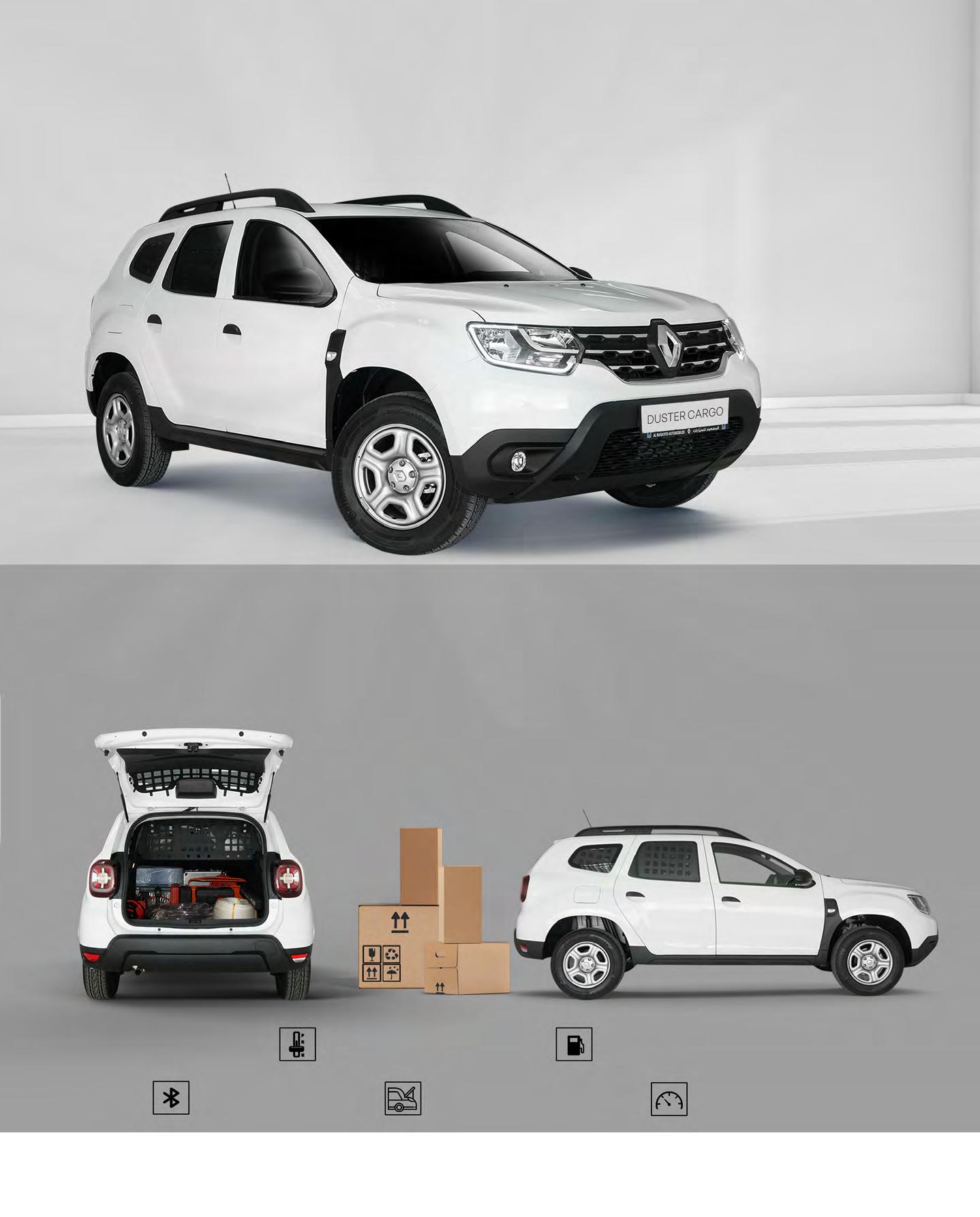Bridgestone's Stefano Sanchini addresses urban mobility
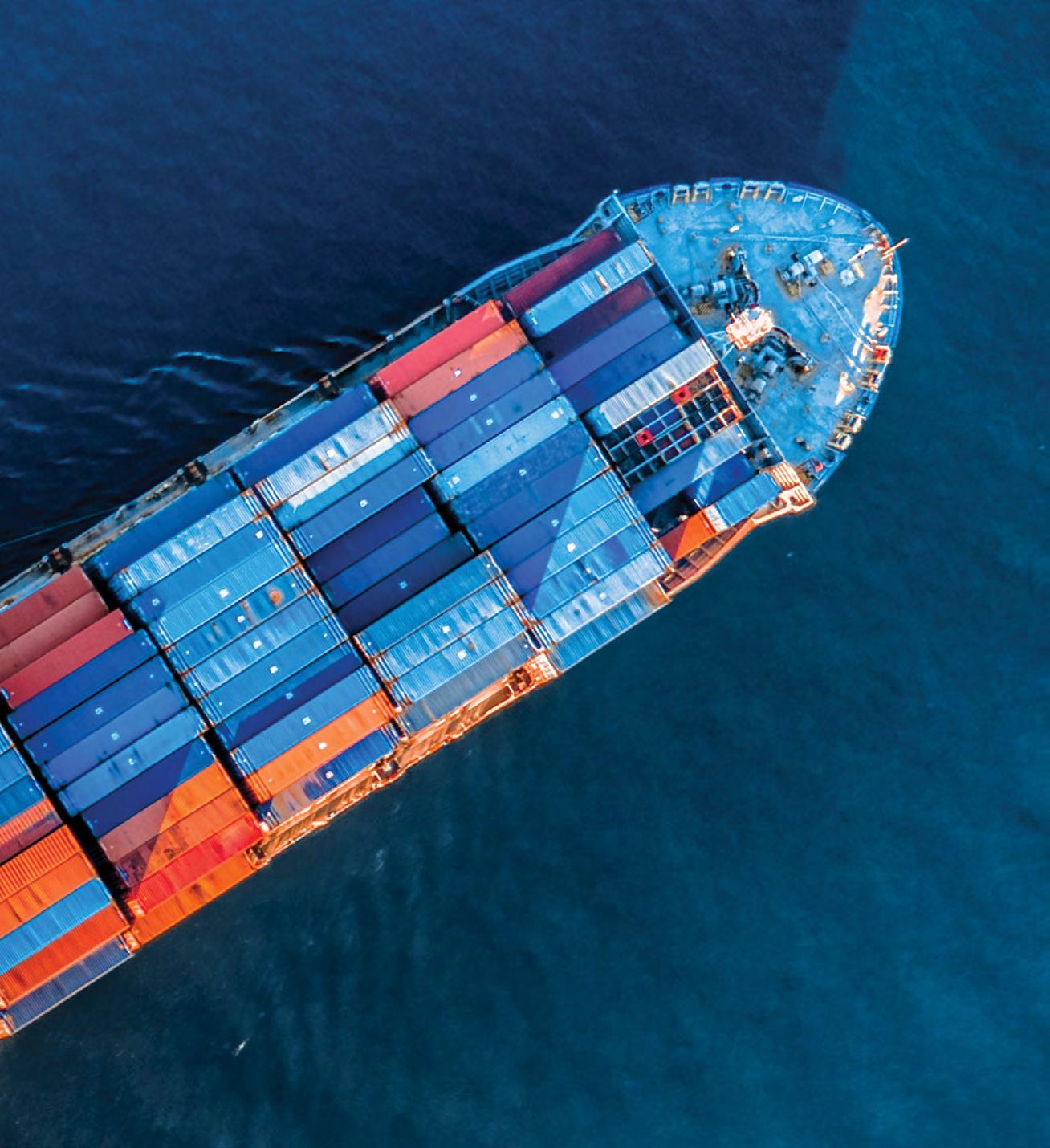

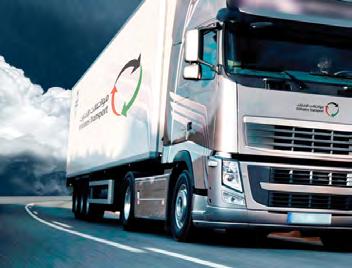





















Bridgestone's Stefano Sanchini addresses urban mobility























Since the launch of DP World’s eCommerce platform DUBUY.com in April, the B2B marketplace has seen exponential growth. We sit with Mahmood
Al Bastaki, Chief Operating Officer at DT World - DP World to tell us more
18 TALKING POINT


A QUEST TO SECURE THE FUTURE OF LOGISTICS
Oman-based Asyad Group is technologically arming itself to meet market needs and empower a more future-proof sector
28 OP-ED
ADDRESSING URBAN MOBILITY
Stefano Sanchini, Regional Managing Director, Bridgestone writes about the rise of digitally enabled solutions in urban mobility
30 EVENT REVIEW
TECHNOLOGY AT THE FOREFRONT
Hypermotion’s first show outside Europe solidifies Dubai’s status as next-generation transport and mobility accelerator
34 EVENT REVIEW
IRF MEETING CALLS FOR CONSENSUSBUILDING AND SUSTAINABLE MOBILITY
IRF World Meeting showcased relevant knowledge to a wide cross-section of road mobility stakeholders and focused on delivering solutions to the world’s pressing mobility questions
38 INTERVIEW SWIFT AND SECURE
The CEO of Pakistan’s fastest growing logistics start up, Muhammad Uns, talks about what makes Swyft a success and of the country’s budding eCommerce potential
42 TRUCKS ALLISON TRANSMISSION POWERED MERCEDES-BENZ ATEGO MAKES FOR A SEAMLESS DRIVE
Efficiency and reliability are what the Mercedes-Benz Atego champion as it offers the users a smooth driving experience coupled with reduced costs and increased safety
44 TRUCKS
UD TRUCKS LAUNCHES NEW EURO 5 RANGE IN THE REGION
New Euro 5 range offers enhanced durability and boosts profitability and includes the Euro 5 Quester and Croner
46 SUSTAINABILITY
GREEN HYDROGEN FUELS
set to be the backbone for the sector’s decarbonisation, IRENA says

As the world gets more digital savvy, we see eCommerce broaden to include never seen before sectors enter this domain. The pandemic further accelerated this. According to a report conducted by the Legatum Center for Development and Entrepreneurship at MIT and Wamda the eCommerce sector doubled in size from USD4.2 billion in 2015 to USD8.3 billion by 2017.
This was due to a rapid rise in internet penetration, the arrival of 4G, and a young population inclined to making purchases online. The report further says that today, 80% of young Arabs shop online frequently, compared to 71% in 2019. In addition, 50% of those aged 18-24 in MENA are shopping more online after the pandemic.
As a result, the sector reached a value of USD22 billion by the end of 2020.
eCommerce has been the digital backbone for innovation in the entrepreneurship sector in MENA. Its growth during the pandemic has benefitted the broader ecosystem - specifically the logistics and fintech sectors, the report reveals.
This has pushed retailers from all sectors to offer products online – from furniture and cutlery to live plants. We’ve also seen eCommerce enter the business-to-business (B2B) space in the UAE.
In early 2020, we were introduced to Tradeling, a Dubai-based B2B platform backed by Dubai Airport Freezone Authority. The marketplace was introduced to help businesses across Middle East & North Africa procure different products from all around the world. In less than two years, the platform has signed deals with multiple entities from local eCommerce companies to international trade bodies.
Earlier this year, DP World the UAE-based multinational logistics company entered the B2B eCommerce segment and launched DUBUY.ae. The marketplace initially introduced in Rwanda, Ethiopia and now Kenya is helping unlock access to global markets for small and mediumsized UAE enterprises, using DP World’s endto-end integrated supply chain services to fulfil orders for export and to receive goods.
Our cover story delves into why DP World is moving into the eCommerce domain, why Africa and how technology is reshaping the logistics sector.
Jochebed Menon Editor,
Logistics NewsMiddle East jochebed@bncpublishing.net



CEO Wissam Younane wissam@bncpublishing.net
DIRECTOR Rabih Najm rabih@bncpublishing.net
GROUP PUBLISHING DIRECTOR Joaquim D'Costa jo@bncpublishing.net
+971 50 440 2706
BUSINESS DEVELOPMENT DIRECTOR Rabih Naderi rabih.naderi@bncpublishing.net +966 50 328 9818
MANAGING EDITOR Kasun Illankoon kasun@bncpublishing.net
EDITOR Jochebed Menon
EDITORIAL DESIGN Christian Harb
MARKETING EXECUTIVE Aaron Joshua Sinanbam aj@bncpublishing.net
PHOTOGRAPHER Alexander Bungas
subscriptions@bncpublishing.net
For all commercial enquiries, contact sales@bncpublishing.net T +971 50 440 2706 PO Box 502511 Dubai, United Arab Emirates P +971 4 4200 506 |
All rights reserved © 2021. Opinions expressed are solely those of the contributors.
Logistics News ME and all subsidiary publications in the MENA region are officially licensed exclusively to BNC Publishing in the MENA region by Logistics News ME. No part of this magazine may be reproduced or transmitted in any form or by any means without written permission of the publisher.
Images used in Logistics News ME are credited when necessary. Attributed use of copyrighted images with permission. All images not credited courtesy Shutterstock.
Printed by UPP SUBSCRIBE
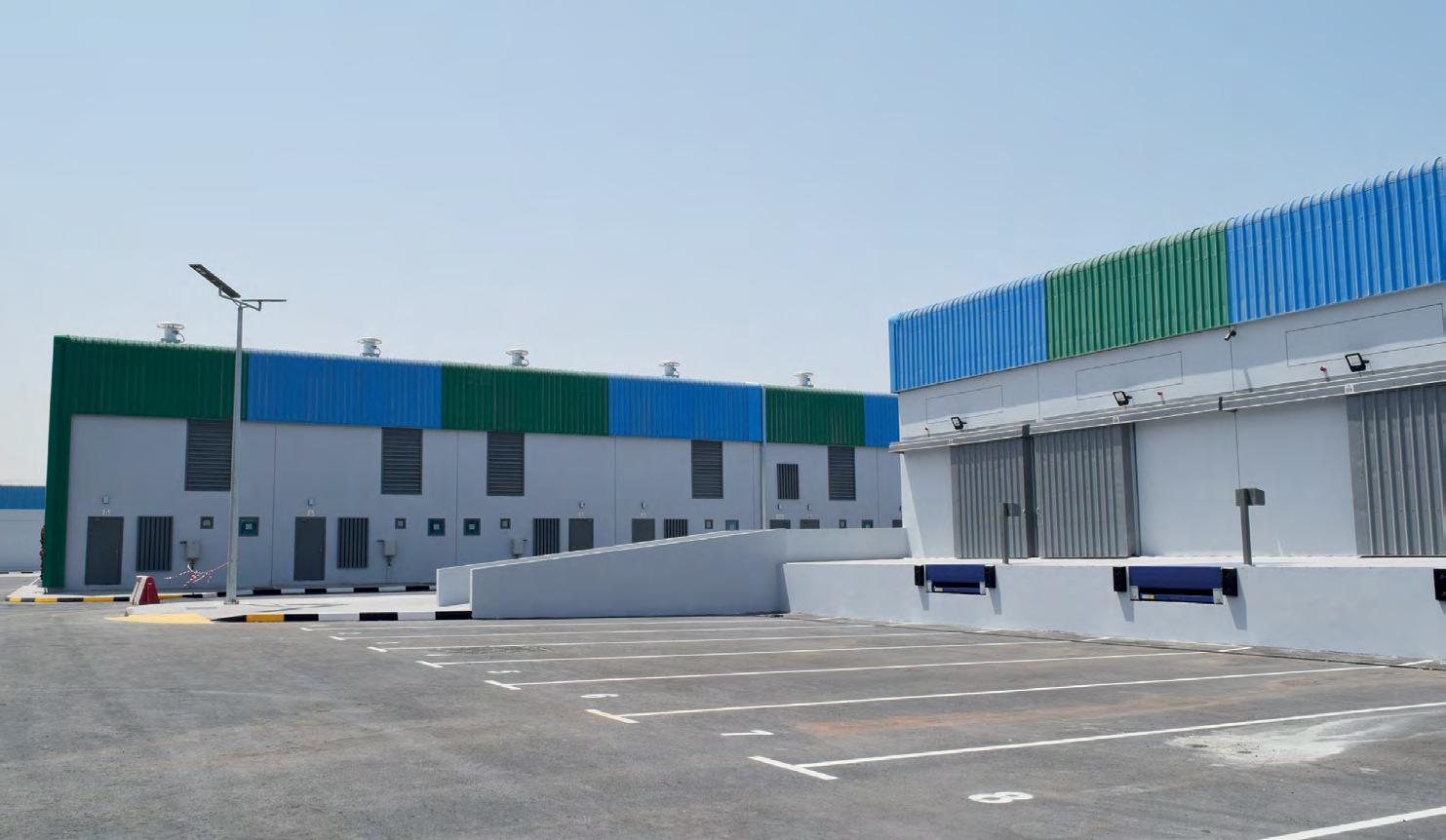



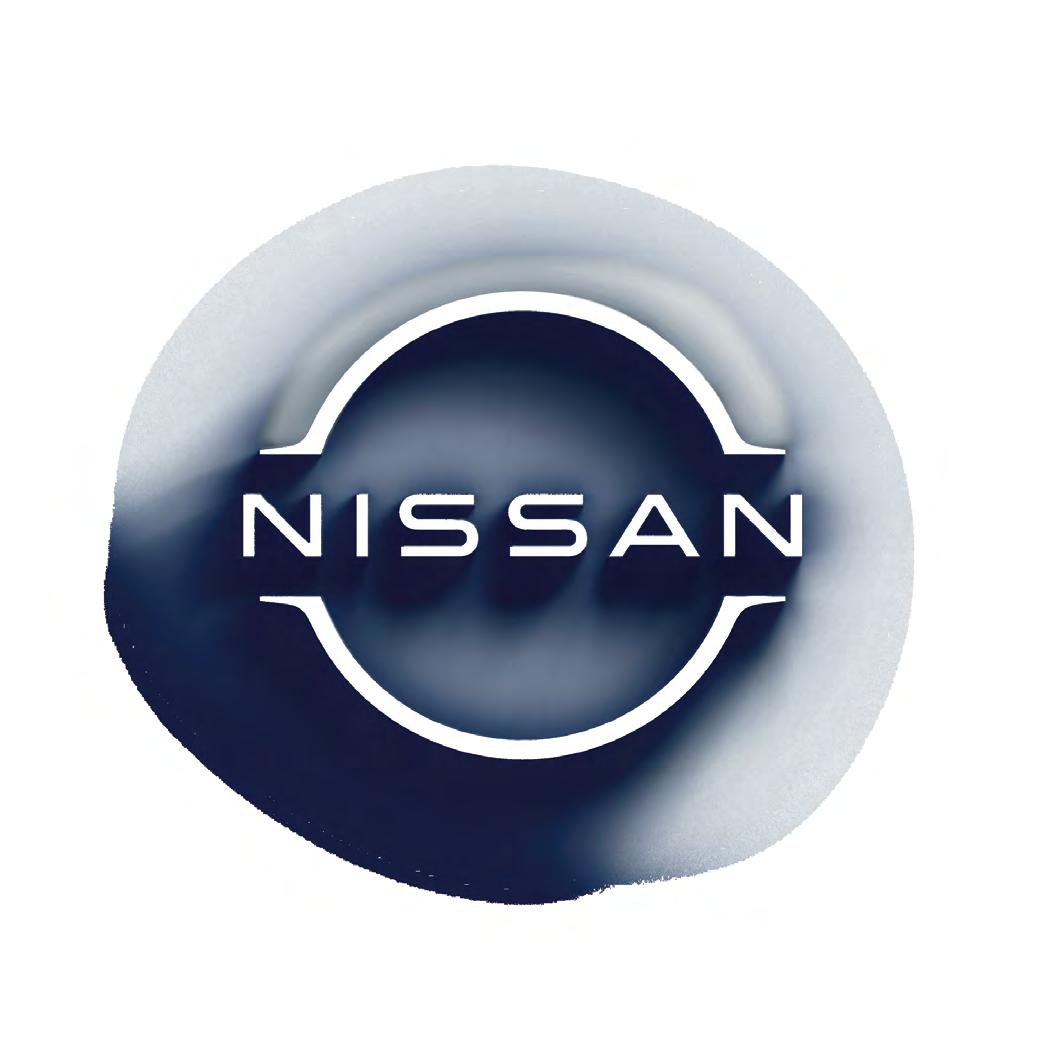








Dubai Airshow 2021 was officially the biggest edition of the event since it first began in 1989, with an astonishing USD78 billion worth of deals announced during the week.
The mega event welcomed more than 104,000 attendees and witnessed a 50% increase in trade visitors which included global senior executives from 148 countries. The Airshow was bigger than the pre-pandemic 2019 edition in terms of visitor numbers and deals announced. It was also a significant milestone for the defence and space sectors which saw a range of deals and agreements declared.
Timothy Hawes, Managing Director at Tarsus Middle East, organisers of Dubai Airshow 2021 said: “It has been a truly incredible Dubai Airshow. The event has been a real testament to the resilience, robustness and adaptability of the aviation and aerospace industries to come back with such strength after the pandemic.
“We have seen an industry transition with significant levels of innovation, technological advancement, and digital transformation right across the show with many exhibitors displaying brand new solutions. There have also been greater commitments towards sustainability and decarbonisation, which is of critical importance across the globe. The attendance levels of global senior executives from across the industries has also never been higher than this year.”
Some of the notable deals which took place during the event included Airbus who announced orders and commitments totalling 408 aircraft (269 firm orders and 139 commitments). The agreements covered the full range of commercial aircraft families, including a first commitment for the A350F freighter derivative.
Airbus launched its latest global market forecast outlining progressively shifting demand from fleet growth to accelerated retirement of older, less fuel-efficient aircraft resulting in a need for some 39,000
new-build passenger and freighter aircraft. Of these, 15, 250 aircraft (around 40%) are for replacements.
On the opening day of the show alone, Indigo Partners portfolio airlines placed a firm order for 255 A321neo Family aircraft, including 29 XLR. This included Wizz Air ordering 102 aircraft (75 A321neo + 27 A321XLR); Frontier 91 aircraft (A321neo); Volaris 39 aircraft (A321neo) and JetSMART 23 aircraft (21 A321neo + 2 A321XLR).
Boeing announced an order of 72 of its 737 Max from new Indian airline Akasa Air. It also announced orders for 11 of its 737-800BCF cargo planes from aircraft leasing company Icelease, nine converted 767-300BCF freighters from DHL, and orders for two of its long-range 777F freighters from Emirates SkyCargo.
Boeing received four orders of passenger planes and freighters from Air Tanzania and three of its widebody 777-300 passenger jets from UAE-based aviation services provider Sky One FZE.
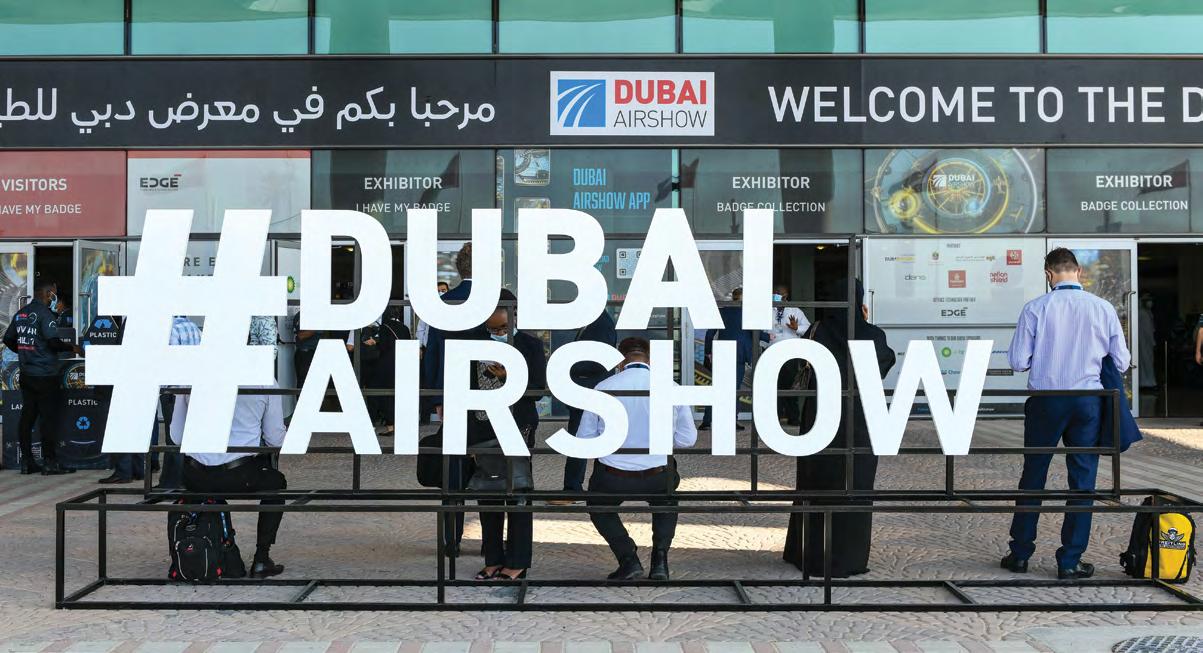
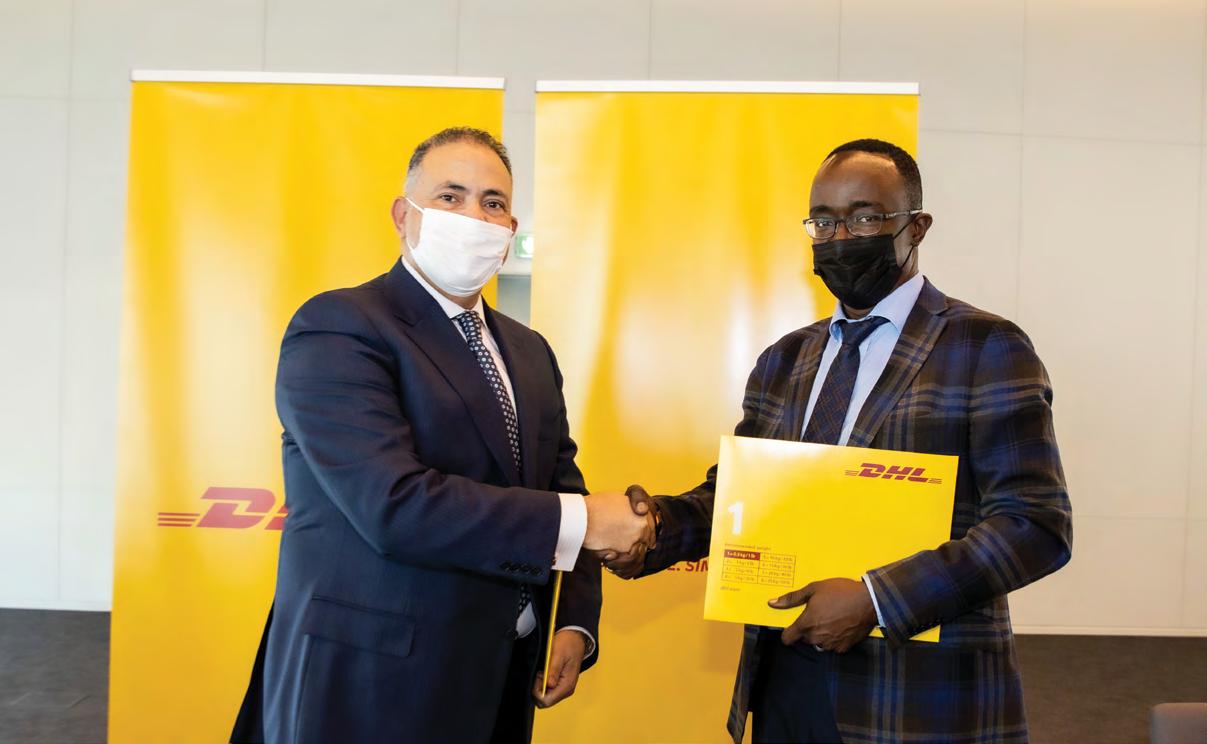
DHL Global Forwarding and CFC Fertilizers and Chemicals LLC UAE [CFC Fert] and its technical partner Evergrow for specialised fertilisers
S.A.E. have signed a Memorandum of Understanding (MoU) to enter into global strategic partnership agreement on the development of exclusive logistics solutions for CFC Fert/Evergrow Groups, covering all aspects of the company’s logistics needs across the globe in line with their growth plans.
The MoU was signed by Amadou Diallo, CEO Middle East and Africa at DHL Global Forwarding, Tobias Maier, CFO DHL Global Forwarding Middle East and Africa, and Dr. Ahmed Khalifa –CFC Fert Group CEO, and Eng. Mohamed Elkheshen, Evergrow Group Chairman& Managing Director.
Amadou Diallo, CEO – Middle East and Africa at DHL Global Forwarding, said: “We are delighted to be supporting CFC Fertilizers and Chemicals as it embarks on the next stage in its global expansion journey. DHL has the proven expertise in handling the logistics needs of the fertiliser and chemicals sector across the world, in line with the safety, environmental regulations, as well as the storage and transportation requirements for the industry.
“DHL’s global footprint, ably backed by its world-class systems and innovative solutions, will be a major enabler in CFC’s plans to become a global leader in its domain.”
Commenting on the agreement, Dr. Khalifa, said: “This logistics partnership will support CFC Fert Group’s current operations, and our new investment plans to build new phosphate and potassium-based fertilizers and animal feed complexes in Egypt and North Africa during the coming 3 years in addition to our commercial expansion plan the 4 Commercial Hubs ‘CFC Fert Hubs’ in Egypt, UAE, Tanzania, and Brazil.”
As part of the agreement, DHL Global Forwarding will manage all logistical movements, as well as import requirements across CFC Fert/Evergrow’s operations globally.
In addition, DHL will also implement a programme of transformational improvements and accelerated digitalisation to support the company’s future growth plans globally.
“There is a need for customised products and services in the fertilizer and chemicals logistics sector – something that requires smarter, more flexible and more automated logistics concepts. DHL has in place logistics advances that can be adapted to the special requirements of the chemical industry with CFC Fert/Evergrow,” added Diallo.

Dubai Industrial City has announced that WenChao Group is investing more than Dhs735 million to construct a world-class food manufacturing and distribution facility in the business district.
The new agreement was signed at the Global Manufacturing and Industrialisation Summit.
Founded in Dubai in 2006, WenChao Group has a diverse portfolio which also includes a retail group integrating eCommerce logistics, chain hypermarket ‘Wemart’ and food processing. The organisation has also founded several F&B brands, including YaoYi Tea and Tasty Yue, and boasts a global trade network covering nearly 20 countries.
The first phase of the WenChao Logistics Hub Dubai is scheduled to begin in the first half of 2022, comprising an integrated warehouse, distribution centre, food processing and manufacturing plant for semi-cooked and braised food.
The more than 950,000 sq. ft factory will incorporate the latest technology to support a predicted food production turnover worth up to Dhs500 million annually.
Saud Abu Al-Shawareb, Managing Director of Industrial City, said, “We are
honoured to welcome WenChao Group into our comprehensive ecosystem. For well over a decade, they have demonstrated tremendous innovation and growth with their production and storage activities, as well as e-commerce logistics.”
He added: “This new partnership demonstrates Dubai Industrial City’s commit-
ment to the Operation 300bn strategy by enhancing the UAE’s industrial sector and diversifying our national economy. This factory will play a major role in localising food production and distribution and feed our ambitions to develop a more sustainable and self-reliant future.”
Jiansheng Sun, Chairman of WenChao Group said: “We are excited to set up our logistic hub in Dubai Industrial City, the first significant milestone of our strategic cooperation. We look forward to creating new engines of opportunity for growth and innovation, building on Dubai’s leading position as a hub for innovation. The new world-class logistics and food production facility in Dubai Industrial City will place us in a strong position to manufacture, store and distribute food efficiently while contributing to the local economy.”
WenChao Group also owns the WenChao Green Farm in Dubai’s Nazwa desert region since 2012, where they grow approximately 50 varieties of vegetables across 80,000 sq. ft. They employ ecologically friendly agricultural methods, swapping out chemical pesticide or fertiliser for organic manure and manual weeding.
The company aims to venture into vertical farming in 2023 by taking advantage of cutting-edge agricultural technologies to overcome challenges posed by the natural desert environment. The second growth phase will see the construction of a 4 million sq. ft vertical farm set for completion in 2025.

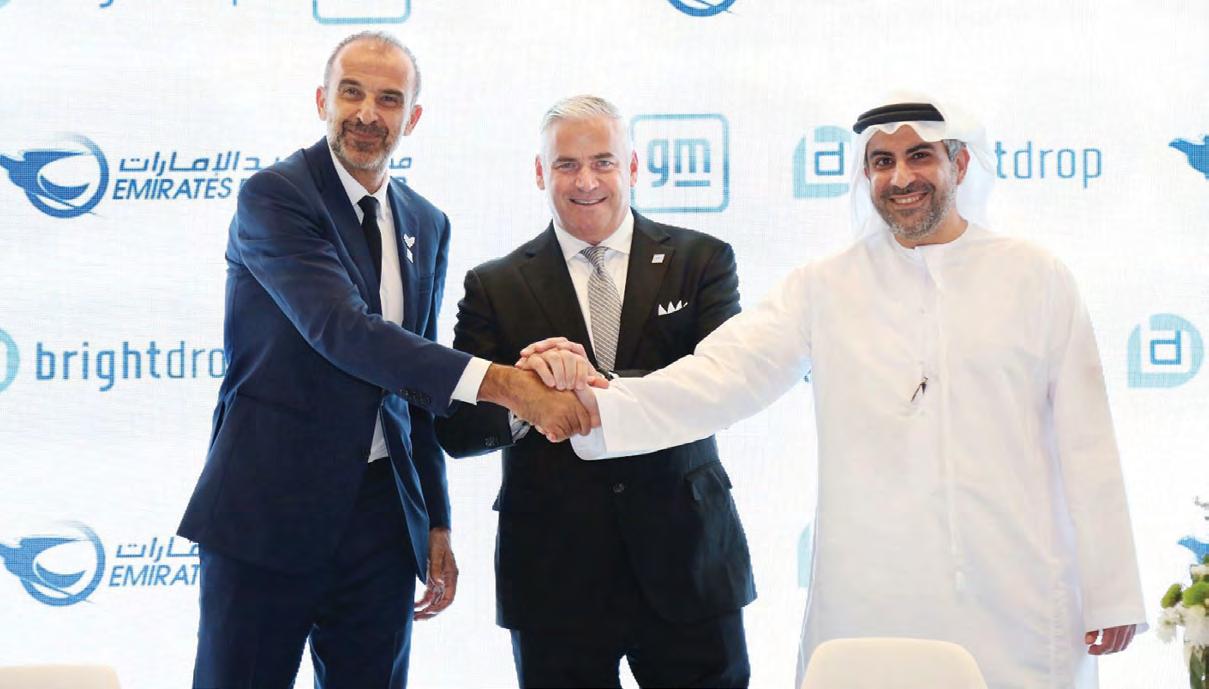
EMIRATES POST GROUP INKS DEAL WITH BRIGHTDROP TO BOOST LAST MILE SOLUTIONS
Emirates Post Group (EPG) announced its latest collaboration following a Memorandum of Understanding (MoU) which it signed with BrightDrop Solutions LLC (BrightDrop), a new business from General Motors (GM), reimagining the commercial delivery and logistics industry for an all-electric future.
The agreement seeks to support EPG’s growing operations at Emirates Post, the UAE’s official postal operator and leading express services provider for more efficient, smarter, and sustainable last mile solutions.
The agreement was signed by Badr Al Olama, Chairman of Emirates Post Group, and Luay Al Shurafa, President and Managing Director of General Motors Africa and Middle East, during the third day of the 4th Global Manufacturing and Industrialisation Summit.
The signing of the agreement is in line with the shared vision of both parties to explore opportunities around sustainable logistics services in the UAE, particularly in delivery vehicles.
In addition, the parties agreed to cooperate in testing future proof of concepts in line with their respective goals and strategies, including the deployment of an electrified delivery ecosystem and other new, innovative technologies.
Badr Al-Olama, Chairman, Emirates Post Group said: “Emirates Post Group is transforming its business and adopting intelligent solutions to establish competitive advantage, while promoting sustainable solutions.
“We are pleased to work with BrightDrop to meet smarter and more efficient last mile services. This new agreement fosters our commitment in improving our operations to be more dynamic, optimised, and eco-friendly.”
Emirates Post Group will explore how to leverage BrightDrop’s ecosystem of connected delivery products, software, and services to create a more sustainable and more efficient transport of goods.
BrightDrop’s solutions are designed to reduce carbon emissions and congestion, while helping companies like EPG decrease costs, increase productivity, prioritize driver safety, and support sustainability goals.
Travis Katz, CEO and President of BrightDrop said: “The rise in eCommerce is creating challenges globally. Electrifying EPG’s delivery fleet could help to combat the negative effects of vehicle-related emissions on climate change, while incorporating BrightDrop’s connected products could help reduce delivery costs and improve safety on roads across the UAE.
“Our ecosystem is centred around industry-leading, high-tech solutions designed to make the world a cleaner and more sustainable place to live and work, and we believe it’s collaborations like this that will help accelerate the development and deployment of these technologies on a global scale.”

Rafed, the UAE’s prime group purchasing organisation (GPO) for the procurement, supply chain management, storage and distribution of essential medical equipment pharmaceuticals has set ambitious expansion plans across the emirates, fuelled by cutting-edge technology and industry 4.0 enabled warehousing.
The Abu Dhabi-based organisation, which marks its 12-month anniversary, has quickly established itself as a leader in the UAE’s pharmaceutical logistics sector, successfully operating out of its warehouse and storage facility of the future, the Rafed Distribution Centre.
While playing a pivotal role in the HOPE Consortium’s vaccination efforts – housing the country’s largest cold chain storage capabilities – the Centre’s advanced technology has also enabled Rafed to revolutionise the healthcare procurement sector.
With these advanced capabilities, Rafed will drive forward the healthcare supply chain as well as cement its expansion into Dubai and the Northern Emirates.
Rafed’s CEO Rashed Al Qubaisi said: “State-of-the-art warehouses that operate to Industry 4.0 standards, including robotics, security systems and process digitalisation will be critical to the growth and progression of the entire healthcare supply chain.
“In recent months we have established a presence across other emirates and across the globe, which support our plans to launch strategic hubs that will support our solutions and effectively reduce costs to healthcare providers and pharmacies across the country.”
Al Qubaisi explains that the partnerships & collaborations that Rafed has done over the span of one year since establishment is not only a testament to Rafed’s suc-
cess and ability to deliver cost-effective logistics solutions but has also accelerated its expansion to serve an extended network of hospitals, clinics and pharmacies through competitive delivery, procurement, pricing and contracting across the UAE.
Al Qubaisi said: “The acquisition by Pure Health in April 2021 has only fuelled Rafed’s ambitions. As the preferred procurement and logistics organisation for the government healthcare providers, Rafed has now set its sights on growing its presence within the private sector.”
“During the past 12 months, Rafed has grown from an in-house department to a UAE entity supporting all corners of the UAE’s healthcare procurement needs, celebrating key milestones, which have cemented its position as leader within the industry.
“These include its role as a founding partner in the HOPE Consortium, the procurement and supply of COVID-19 vaccines through the Rafed Distribution Centre, securing the first global shipment of the breakthrough treatment for COVID-19 – Sotrovimab and securing the first procurement contract for AstraZeneca’s AZD7442 – the world’s first long-acting antibody COVID-19 medication.”
Ahmed Al Bastaki, Rafed’s Chief Strategy Officer, added: “A key focus for Rafed during the pandemic has been to further establish ourselves as an industry expert in the healthcare sector. Working with associations and manufacturers directly will enable further change for the healthcare procurement supply chain. Our strength over the past 12 months has been our ability to optimise resourcing for hospitals and our direct clients. Now we can also create opportunities for manufacturers, agents and suppliers.”
In addition to smart warehouses and partnerships that provide advanced solutions to organisations at every stage of the supply chain, Rafed continues to develop smart systems that will streamline processes across its operations.
Through the partnership with Pure Health, it plans to introduce an integrated SAP digital system to provide immediate procurement and logistics solutions to clients and introduce an enterprise resource planning (ERP) system to identify processes that can be automated.
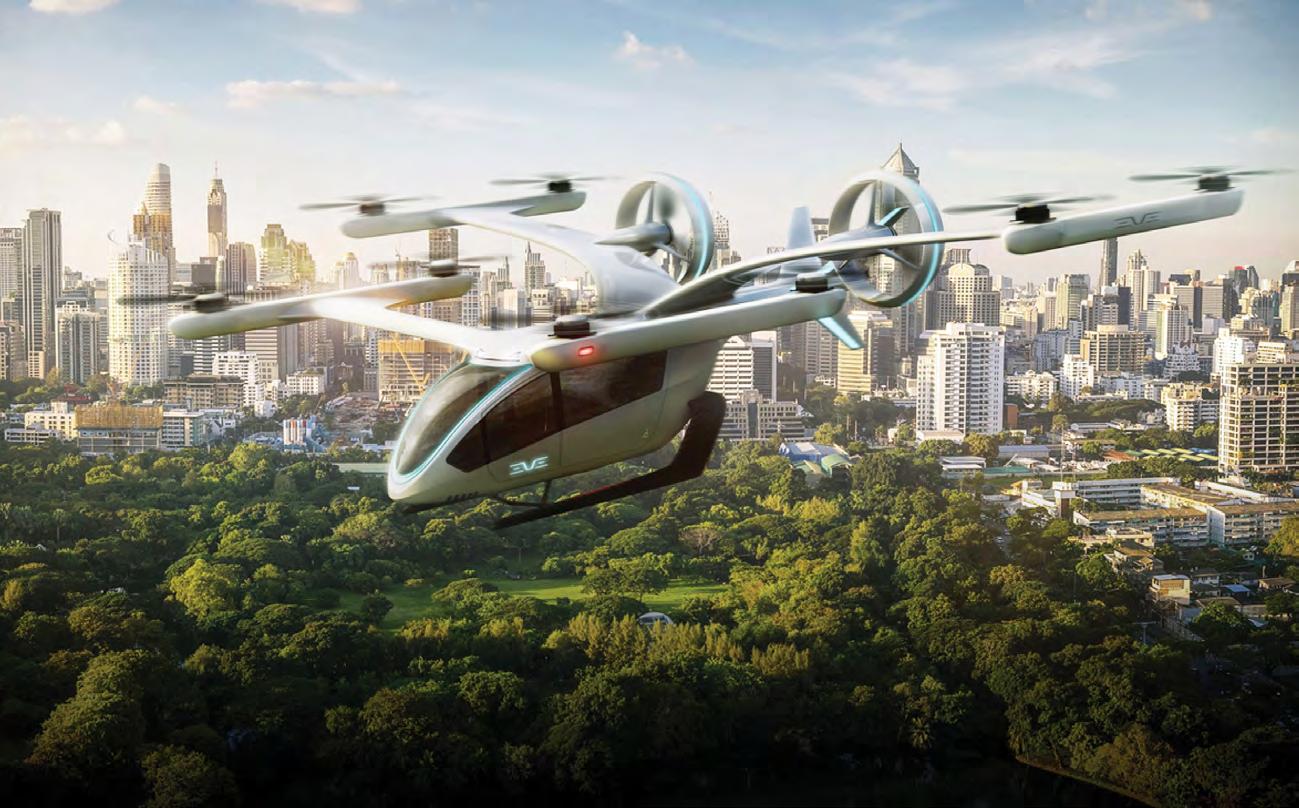
Dubai-based Jetex, a general aviation trip support company, and Eve Urban Air Mobility, an Embraer company, signed a Memorandum of Understanding and announced a partnership aimed at developing the Urban Air Mobility (UAM) ecosystem.
UAM will make air commuting more accessible and convenient for everyone. 100% electric, quiet and safe, electric vertical takeoff and landing (eVTOL) aircraft are the future of transportation aimed at easing congestion and bypassing any potential ground mobility restrictions.
The creation of disruptive and widely accessible UAM solutions will help democratise mobility by making it more accessible, affordable, and offering communities more options.
The new eVTOL aircraft concept results from a broad range of tests and simulations, aiming at operational optimisation for the urban environment, considering high reliability, low operating costs, a lower noise footprint, being fully electric powered and progressively autonomous. With their global expertise, Jetex and Eve will explore the possibilities to develop UAM infrastructure in various locations, map potential operations in different environments and their efficient integration.
A recognised leader in exceptional customer service, Jetex will lend its experience to design a seamless passenger journey, which will be aimed at utmost comfort and convenience. Jetex will also work closely with different authorities to ensure that the new concept complies with local regulations and requirements.
“Jetex is a recognised leader in innovation, and we always seek new ways to integrate new concepts ahead of the market. The new partnership will allow us to support Eve’s aircraft and product development process, which will help guide the integration of UAM with our overall operations,” said Adel Mardini, Founder & CEO of Jetex.
Backed by Embraer’s more than 50year history of aircraft manufacturing and certification expertise, Eve unveils a unique value proposition by offering a suite of products and services.
Eve’s zero-emission and low noise eVTOL represents a simple and intuitive design that continues to reach development milestones, including the first flight of the engineering simulator in July 2020, and a proof of concept in October 2020.

Oman-based Asyad Group is technologically arming itself to meet market needs and empower a more future-proof sector
We need new ideas,” says Eng. Abdulrahman Al Hatmi, Group CEO, Asyad Group. “I think the world is full of talent and it needs to be tapped. There is a multitude of intellect in the world. Hopefully, we will get some great ideas out of this challenge, and some good minds will come up with fantastic
proposals that we can adopt and integrate, and hence make a difference in our business and to the bottom line.”
Asyad Group has already positioned itself as an integrated logistics solutions provider and a logistics hub in the Middle East and North Africa region, but now, it is investing in research and development in order to employ big data and emerging technologies to develop sustainable solu-
tions and future-proof a more resilient global supply chain.
“We see ourselves as a logistics frontrunner in the region in terms of integrating solutions, whether it be shipping, land, or air solutions, and of course, free zone offerings to provide customer with a unique proposition that serves their purpose,” says Al Hatmi, adding that the idea for the Global Logistics Hackathon originates from his belief that technology will help the whole industry to provide the best offering to its customers.
In more detail, Al Hatmi explains that he is taking the lead on the technology front in a hope to offer fit-for-purpose solutions to customers and the economy. “We want to couple technological offerings with a
cost benefit analysis to help the economy in terms of employment,” he says, adding how technology can help overcome cultural obstacles.
“For example, working on logistics jobs wasn’t attractive for young people. We then automated the cranes, which are now operated through a control centre. Now, these jobs have become very popular with the locals. It’s a slightly uplifted job that is intellectually challenging. This is a very good example of technology enabling jobs.”
The company is also focusing on employing robotics at fulfilment centres and last mile delivery. “We’re looking at blockchain technology and unified trading solutions where all customers and service providers can access a single platform to meet their needs,” Al Hatmi notes. Artificial intelligence (AI) is another area of interest for Asyad Group. It hopes to use AI to provide commercial information to its teams. “We’re looking at all sorts of technologies that can be put together and hopefully pro-
vide a great product, which is a standout solution to our customers and our employees,” he adds.
Apart from technologically enabling itself, Asyad Group is looking to become a global player by first tapping into the Indian subcontinent and Africa.
“We need to expand our targeted markets beyond the GCC.” Al Hatmi explains. “We need to tap bigger markets. We all know that logistics is a very tough business with small profit margins. Therefore, we need to deal with larger volumes to scale up the business.”
India is quite a promising market, he adds. “The GDP growth is going to be pretty good. I think you’re looking at 7% year-on-year. Africa is an emerging market; they’re still upcoming and now is the right time to support these growing economies. I think that, if we succeed in positioning ourselves as a service provider to these countries, it will be a win-win situation.”

“WE NEED TO TAP BIGGER MARKETS. WE ALL KNOW THAT LOGISTICS IS A VERY TOUGH BUSINESS WITH SMALL PROFIT MARGINS. THEREFORE, WE NEED TO DEAL WITH LARGER VOLUMES TO SCALE UP THE BUSINESS.”
The GCC region, with its 40 million residents, is considered a small market for the logistics sector. Additionally, the region is home to some of the largest logistics firms. This has made competition even tougher for a sector that is already tight on profit margins.

“Competition is tough, let’s not shy away from that fact,” Al Hatmy says. “Everybody around us has the same aspirations. Everybody’s driving the diversification agenda to turn away from oil and fossil fuel whether it’s regionally or globally. It’s easy to turn to logistics as a source of diversification. But we cherish good competition because it makes you sharper. It makes the industry much more attractive. And to be honest, if anything that the COVID-19 pandemic has showcased, it is that logistics is a ‘make it or break it’ test for economies. And I think that is probably the key message to take away from this situation.”
Expanding on how the COVID-19 pandemic has drastically impacted global supply chains, causing a lack of products and parts available in the market, Al Hatmi says, “We simply cannot get access to products, as there is a break in the supply chain,” says Al Hatmi. >>>
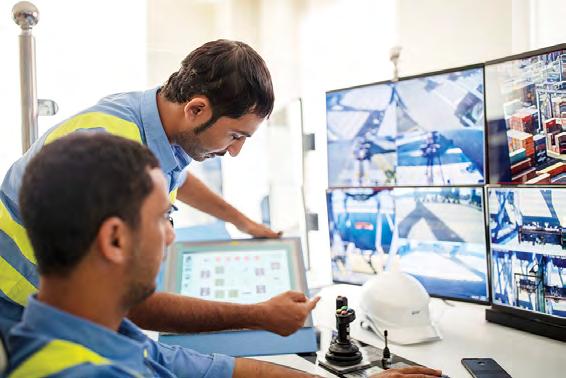
“Freight rates aren’t going to get better for a year or more due to the chaos. It’s going to take time to settle the chaos. And it’s not just freight rates. It’s a lack of supply. You can’t get enough boxes, containers, or enough ships to move the products. It is affecting the availability, which is worse. So, even if you want to pay, you can’t get material because it’s not available anymore.”
Al Hatmi is of the opinion that there is going to be a global shift in the industry. “I think decentralisation will be the name of the game for logistics,” he says. “With the ongoing geo-politics, trade wars and tariffs, decentralisation is the only solution.” Another issue, he reveals, that is plaguing the industry is the lack of talent. “The competition for the right resources and talent is enormous. We need to find great talent. The sector is redefining itself from offering mundane jobs, such as truck driving and warehouse storekeepers, to enabling highly intellectual, highly demanding careers.
Now, you need different sets of skills, such as commercial and technology related skills, to enter the market.”
At the end of the day, Al Hatmi believes that the road ahead is going to be challenging, but it also brings with it opportunities. “The logistics sector is undergoing a major overhaul with technology at the forefront, and we need to be prepared for it to succeed,” Al Hatmi concludes.
“EVERYBODY’S DRIVING THE DIVERSIFICATION AGENDA TO TURN AWAY FROM OIL AND FOSSIL FUEL WHETHER IT’S REGIONALLY OR GLOBALLY.”



Choosing a gas powered truck will put you and your fleet in the forefront of sustainable truck operations, reduce your CO2 emissions and achieve Euro 6 Emission Legislation without using Adblue or Particulate Matter. Well suited for both urban and regional operations. It can be matched with R, G, L or P cabs and combined with either the Scania Opticruise gearbox or automatic transmissions.
For more information about our Alternative Fuels options, please visit www.scania.com/ae/en/home/products-and-services/articles/alternative-fuels.html
SINCE THE LAUNCH OF DP WORLD’S ECOMMERCE PLATFORM DUBUY.COM IN APRIL, THE B2B MARKETPLACE HAS SEEN EXPONENTIAL GROWTH.
We sit with Mahmood Al Bastaki, Chief Operating Officer at DT World - DP World to tell us more.

“Our aspiration as an eCommerce platform is to be global, to buy from anywhere, and ship to anywhere. That’s the whole idea. But our focus at the beginning is to tackle the Africa region.”


Africa has always been a strategic market for DP World, the Emirati multinational logistics company has been investing in the continent for a few years now. Earlier this year in April, it announced the launch of DUBUY.com, a global wholesale eCommerce platform, available first in Rwanda and Ethiopia with plans to expand across Africa and eventually around the world.
DUBUY.com adds digital trading corridors to the physical corridors DP World has built across the African continent with its investment in ports, terminals, and logistics operations. “The marketplace represents a new model of partnership with the UAE, designed to strengthen the existing potential in Africa,” says Mahmood Al Bastaki, Chief Operating Officer of Dubai Trade World. “This technology allows home grown businesses to become international manufacturers and exporters - by linking them with new markets in Africa, the Middle East and eventually the rest of the world,” he adds. >>>
In October, the platform was introduced in Kenya. Within just six months the platform has become a major gateway for trade in the East Africa region. “Kenya is very strategic for us as a hub in the eastern part of Africa,” he reveals.
“The country has the potential to embrace our eCommerce platform. Looking at Kenya’s demography, the internet penetration is quite good, with just over 40%. The smartphone spread is 98% and active social media users are 20% of the population.”
Furthermore, Kenya and UAE have a good trade relationship. “They welcome international investments and are keen to partner with UAE,” Mahmood notes. In 2019, UAE’s export to Kenya was valued at about USD1.8 billion.
Kenya’s 2030 Vision of transforming the country into a newly industrialising, middle-income country fits in with DUBUY.com’s vision of digitally connecting Kenyan buyers and sellers with the rest of the world.
DP World has also partnered with Kenyan National Chamber of Commerce to connect with key logistics providers and solution providers. It has also collaborated with governments of states to strengthen its presence in the continent.
Mahmood explains in detail: “This way we’re building trust in the platform for buyers in Africa. There’s a lot of purchasing happening through mobile devices as well as mobile payments and we’re leveraging on that for the success of our eCommerce platform. We are a brand they can trust.
“Africa is an upcoming continent with a large young population between the ages of 18 to 30. These young people are the future. They are embracing technology. Our aspiration as an eCommerce platform is to be global, to buy from anywhere, and ship to anywhere. That’s the whole idea. But our focus at the beginning is to tackle the Africa region.”
DP World has a presence in 11 African countries and further expanding its footprint in the region. In July, it acquired JSE-listed Imperial Logistics, an integrated logistics and market access company with operations mainly across the African continent and in Europe.
“We see huge potential in Africa. It is providing us with a lot of opportunities, and we offer them many prospects too. It’s a two-way street. We go as a partner - creating jobs, enhancing competencies, and offering training.

We grow the economy together and participate in the sustainable development of the nation. That’s the whole essence of our eCommerce offering deployed in Africa,” he reveals.
The combination of DUBUY.com’s advanced technology and DP World’s physical infrastructure offers a secure and reliable way for organisations in Kenya to develop, expand and crucially, improve supply chain connectivity and resilience as the country recover from the COVID-19 pandemic.
It will also solve some of the key challenges facing the growth of eCommerce in Africa, including reliable fulfilment, secure financial transactions, and the movement of goods.
DP World is leaving no stone unturned to ensure DUBUY.com is a success. Since its launch the marketplace has undergone several enhancements to better user browsing experience. Additionally, newer payments methods are added.


Mahmood adds: “We offer all kinds of payment methods, mobile, credit card, wire transfer and recently we began offering mPesa. It is quite popular in the eastern Africa region, and customers use it and trust it.”
The site was recently enriched with new products as well. “When we launched, we had 17,000 products. Today, we are showcasing 200,000 products on the platform. We have an aspiration to reach a million in the next nine to 12 months,” he notes.
So far, Mahmood is quite happy with the reception DUBUY.com is receiving in the markets it operates in. “The number of products has increased. Website visits exceeded 550,000 hits. We see keen interest from customers to browse our view products, compare prices, and to try out certain shipments. We just don’t include products from the UAE, we also have sellers from India, China, Turkey, and the US.”
Expanding on which products are popular on the platform, Mahmood says: “We’ve seen a huge demand for automobile parts and have a good number of products in our offering. There are good number of electronics - computer screens, devices for phones, mobile phones, accessories - and some FMCG products. Additionally, there is demand for PPE items such as safety gears like mask and gloves that have been used during the pandemic.”
Seeing a demand for automotive and spare parts, a used car category was introduced and has been well received in the marketplace, Mahmood reveals.
“WE
MEDIATE THE PAYMENT PROCESS AND ENSURE THE SELLERS RECEIVE THEIR MONEY. WE OFFER A SECURE PAYMENT PLATFORM. THIS WAY THE SELLER HAS LIBERTY AND FREEDOM TO PUT MORE PRODUCTS OUT AND ENRICH THEIR OFFERING TO PROSPECTIVE BUYERS.”
The reason for DUBUY.com’s success has been simple, according to Mahmood. “We’re meeting a demand. Both the buyer and seller have access to a large database. For the seller, instead of being restricted to small number of buyers. They have a wider net to market their products to. Same for the buyers they are not limited to a small net of sellers.”
Explaining further, he says: “For buyers to sell more we are integrating a new solution in the site, digital trade finance. We would like the sellers to sell more and the buyers to buy more. The only restriction most businesses have is the access to cash and funds, this drought often impedes their growth and the continuity of placing more orders.
“We are fixing with a ‘buy now and pay later’ solution, which will be provided over the next couple of months. Buyers know we provide a hassle-free service. They know that DUBUY.com is a trustworthy place. A big concern for sellers is ‘will the buyer pay on time’ They may ship the products but if the buyers don’t pay it becomes a cause for concern, here we take full responsibility.
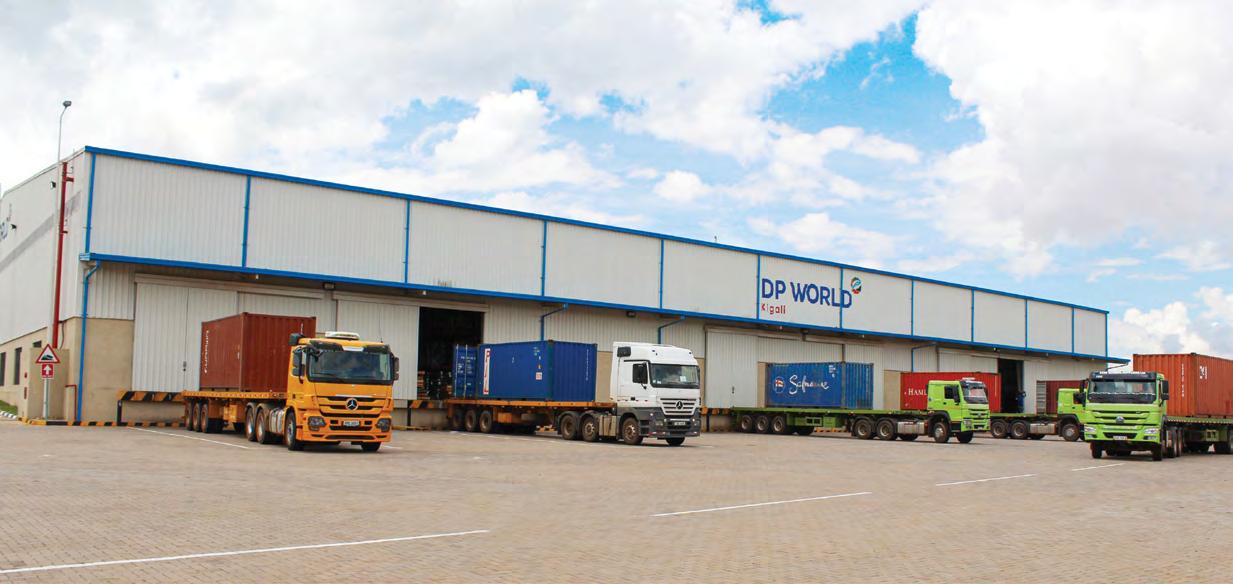
“WE SEE HUGE POTENTIAL IN AFRICA. IT IS PROVIDING US WITH A LOT OF OPPORTUNITIES, AND WE OFFER THEM MANY PROSPECTS TOO. IT’S A TWO-WAY STREET. WE GO AS A PARTNER - CREATING JOBS, ENHANCING COMPETENCIES, AND OFFERING TRAINING.”
“We mediate the payment process and ensure the sellers receive their money. We offer a secure payment platform. This way the seller has liberty and freedom to put more products out and enrich their offering to prospective buyers.”
Mahmood divulges that DP World has big plans for the marketplace. “We want to DUBUY.com to be a global player. We want to enable B2B trade in every corner of the world in a professional, easy, and quick manner. We want DUBUY.com to be the platform of choice, a differentiator, and a hope to the SMEs around the world.”
Expanding on the pipeline for the marketplace, he says: “We are transparent and work with full integrity. We would like the world to trust us and use this to grow their business, this is your gate to the world, and the world to you. This is our aspiration; we will be launching continent by continent. We plan to introduce one million products online by next year and five million in the next couple of years.”
In phase one of its plan, DUBUY.com will be launched in 19 African countries, phase two includes all of Africa. “We want the African countries to trade among each other. This is based on the agreement that was signed and
follows the African Continental Free Trade Area pact.”
Mahmood also hopes that with Common Market for Eastern and Southern Africa (COMESA) in place that allows for cross border trading among African countries with ease and less restriction of tax and duties, and customs duties, there will be increased trading on the platform. “In Africa, you’ll see us grow much faster in the coming months,” he says.
That being said, all necessary precautions are being taken into consideration. He elaborates: “We are tackling one by one country at a time. We don’t want to rush into opening the platform to everybody at this stage. It’s critical because a simple mistake can devastate our reputation. We are now sure that in the coming weeks Kenyan traders will enjoy our eCommerce offering and will reap the benefits of trading on the platform.
“As we grow and expand there will be new products demanded that the suppliers don’t have, or a certain country doesn’t supply. We will work out the demand and supply challenges, which is a big challenge in these areas. Things will be ironed out as we go ahead.”
As an eCommerce platform, the biggest challenges it faces are cyber security issues. “We can’t relax for a single second until every loophole is closed and every possible situation is explored. We have hired the best experts in cyber security and regularly host ethical hacking sessions,” he says.
“We’ve put up the right firewalls, use the latest technology to ensure are not left blindsided or victims of hacking, phishing or website spoofing.”
Some of the non-digital challenges the DP World faces in Africa are warehousing, lack of proper infrastructure, availability of trucks, vans, and containers. He adds: “In fact, availability of containers is becoming a global challenge impeding trade.”
Further explaining on the supply chain woes that have frustrated every possible sector, he says: “Just as we began to recover from the lockdowns, the industry was hit with a shock of scarcity of containers. Shipping line increasing their freight rates to astronomical numbers, which was never witnessed in the last 50 years.”
With shipping company ranking in millions of dollars due to high demand of containers, businesses across the world are hit with a logistics knot that shows few signs of improving.
“The pandemic has brought to light how reliance on a single market can be devasting. With DUBUY.com, we will open to markets that many never attempted to do business with. Many of these countries have excellent products.
“With us being neutral, unbiased to any country, we will openly offer opportunities to countries with good brands to expand their horizons and reach,” Mahmood explains.
Over the past five years, DP World has gradual moved away from being purely a port operator to function as a global trade enabler. Mahmood says: “A lot of focus from our side is on digitising cargo movements that goes from the sellers to the buyer, and we have accomplished much in the special economic zones, free zones, trucking and logistics areas.”
DP World is heavily investing in the cargo and logistics value chain, Mahmood explains. “DP World knows the ins-andout of logistics and the core competencies of eCommerce. We have immense experience in this field and are serving buyers and the sellers across the globe. So, for us it was a natural evolution and a progression to get into eCommerce.
“We want our customers to continue using our ports and our facilities by
giving them an eCommerce solution with a full end-to-end offering.”
He adds that the brand name of DP World is “very strong” which has a presence in the global logistics market.
“Customers trust this name. They know they can transact securely and put their money in the company. Our brand offers them that guarantee.”
For DP World, technology is at the core of its business. It has established its own innovation centres and programmes to seek out smarter solutions for the logistics sector.
“Whether it be artificial intelligence, machine learning, data science or IoT we’re investing in all these fields,” Mahmood explains.
“Technology is no longer an accessory to us; it’s become a necessity. It’s the future. There is a huge push towards the digitising the supply chain in a holistic manner, digitising the freight forwarding business, and the tracking and tracing capabilities in DP World,” he concludes.

“EXPANDING INFRASTRUCTURE CAPACITY IS NOT GOING TO BE A SUSTAINABLE MOVE IN THE LONG RUN AMIDST THE POPULATION BOOM AND EXPONENTIAL RISE IN THE NUMBER OF REGISTERED VEHICLES IN THIS PART OF THE WORLD.”

STEFANO SANCHINI, REGIONAL MANAGING DIRECTOR, BRIDGESTONE WRITES ABOUT THE RISE OF DIGITALLY ENABLED SOLUTIONS IN URBAN MOBILITY
The rapid industrialisation and urbanisation worldwide have brought about major challenges to urban mobility. In the Middle East, the scene is no different with urban mobility concerns continuing to be at the core of regional transport and infrastructure development discussions and policies. With the region steadily moving towards its vision of sustainable and connected cities, developing a holistic model for mobility enhancement has become even more imperative.
Some countries in the region, particularly the Gulf states, have implemented multi-faceted transportation and mobility management strategies. Relevant policies are fundamental, especially as 67% of the world’s population is forecasted to live in cities by 2050.
CONTINUOUS MODERNISATION
Part of the approaches in the GCC is heavy investments in and continuous modernisation and expansion of roads and public transport networks, which are being
supervised by transport authorities with combined planning, investment, and regulation roles.
This tactic has made a huge difference in easing traffic congestion, connecting different parts of the country However expanding infrastructure capacity is not going to be a sustainable move in the long run amidst the population boom and exponential rise in the number of registered vehicles in this part of the world. In the UAE, approximately three million cars plied its roads as per the estimate of the World Health Organisation’s (WHO) Global Status Report on Road Safety in 2018. Recent research also revealed that Dubai has one of the highest ratios of residents to cars globally .
Out-of-the-box and sustainable solutions are but necessary. Investments in new mobility modes have grown over the years, with the GCC region taking the lead in rolling out advanced approaches to transform their transportation networks. The call for innovation also continues to mount with the emergence of what is now known as the sharing economy. We have, thus, witnessed the rising prominence of e-hailing, car sharing, and other digitally enabled transport methods with great impact on mobility.
Dubai serves as a role model in terms of implementing state-of-the-art and innova-
tive urban mobility systems as evidenced by its much-reported testing of hyperloop, self-driving vehicle, and taxi drone projects for future deployments.
The emirate embarks on ambitious initiatives exploring the future of urban mobility to help accelerate its bid to become the globe’s smartest city. Across the GCC, more large-scale and forward-looking initiatives are expected to be launched in support of the region’s steady transition to the Fourth Industrial Revolution.
The Gulf nations, along with other Middle Eastern states, are well-positioned for more effective adoption of unconventional mobility modes due to various reasons, which include fast government decision-making processes and a growing focus on ultramodern urban transportation experience.
New mobility systems require creating a more efficient and highly integrated ecosystem driven mainly by data. For such an ecosystem to be effective, it should support multi-modal and automated transport solutions. In addition, the region’s ambitious development and transformation programs designed to raise its global competitiveness and attractiveness will further hasten the establishment of this modern transport environment.
ROLE OF THE TYRE INDUSTRY
Technologies play a pivotal role in improving human movement in communities. This development has pushed
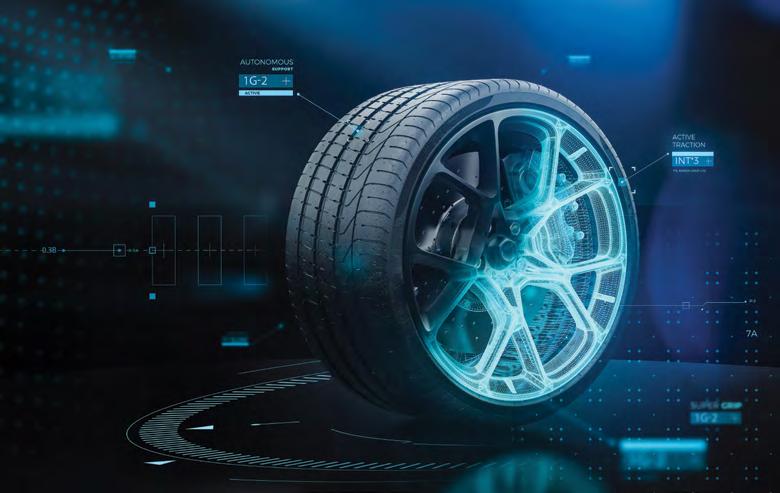
“NEW MOBILITY SYSTEMS REQUIRE CREATING A MORE EFFICIENT AND HIGHLY INTEGRATED ECOSYSTEM DRIVEN MAINLY BY DATA.”
the tyre industry to evolve with the needs of the times and contribute to mobility enhancement.
In this regard, tyre manufacturers have focused on telematic solutions, invehicle data, data sharing, and connected vehicles, to cite a few, to help improve connectivity and road safety on top of promoting sustainability.
They have begun leveraging next-generation technologies such as the Internet of Things (IoT) and artificial intelligence (AI) to transform tyres’ overall role in mobility. Today, we have heard talks about smart tyres, which will have the ability to collect data for optimised performance and safety, and Tyres-as-aService business models. The full implementation of the 5G technology is seen to further impact the tyre market’s efforts to keep pace with the modern changes.
The regional and global tyre industries will continuously evolve in keeping with the rising need for ground-breaking transport models that support the concept of CASE or connected cars, autonomous driving, sharing and electrification.
There are numerous lessons to learn from the experience of the GCC and the Middle East as a whole. Other countries may follow in the region’s footsteps in terms of willingness to invest in advanced mobility solutions, creating relevant strategies, and implementing fast regulatory changes. The GCC’s progress in its efforts to shift to an integrated system to maximise public transport use and commitment to continually look for, test and deploy new technologies are equally commendable.
An integrated, technology-driven mobility system is without a doubt at the heart of a seamless transport experience. To hurdle current and future obstacles to efficient mobility, new solutions must be applied to build data-enabled, and sustainable urban transport infrastructure.

Hypermotion’s first show outside Europe solidifies Dubai’s status as next-generation transport and mobility accelerator

Material Handling Middle East and Hypermotion
Dubai held at Dubai Exhibition Centre in Expo 2020 Dubai concluded on 4 November 2021 to a resounding success as multiple agreements were signed and new products launched into the market.

Global experts unveiled blueprints for highways of hope which is changing the way the world travels and moves goods. Running from 2-4 November, both the events represented a thriving hub of technology game-changers revolutionising four of the Middle East’s key economic sectors — transport, logistics, mobility, and materials handling.
Pitching the future
HH Sheikh Ahmed bin Saeed Al Maktoum, President of the Dubai Civil Aviation Authority (DCAA), Chairman and Chief Executive of Emirates Group and Chairman of Dubai Airports, who inaugurated Hypermotion Dubai 2021, said: “The fact that Hypermotion was held in Dubai at Expo 2020 is a clear indication of our determination to maintain the emirate at the forefront of smart mobility as well as to leverage and support transformative and disruptive technology towards improving industries, accelerating the development of localised, high-tech economies.”
Held in Dubai for the first time, Hypermotion Dubai attracted a heady mix of public- and private-sector leaders and policy makers, business owners and strategists, start-ups and innovators looking to network and pitch new technology breakthroughs.
It was the first showing of the industry game-changing event outside of Europe
and gathered over 150 global experts speaking at its three sector-leading conferences.
“The conferences laid bare the impending challenges facing these vital sectors and the technology which is enabling change,” explained Simon Mellor, CEO of Messe Frankfurt Middle East.
“Industry delegates were privy to the disruptive technology which can transform industries, super-charge the creation of localised hi-tech economies and better the lives of the people they serve.”
The three-day event also hosted market forecasts for both the GCC logistics and electric vehicles sectors in addition to leading data scientists, who presented at the Asyad Global Hackathon Challenge.
Experts addressing the event’s Hypermotion Lab and Smart Mobility conferences said road and urban transport are undergoing the biggest transformation since the invention of the internal combustion engine in the 1880s with policymakers and regulators facing tough choices needed to drive widespread mindset change.
Anthony Foxx, the former US Transportation Security and Chief Policy Officer of ride sharing app Lyft, said the transport industry had been slow to adopt technological transformation and was now facing a perfect storm of change. >>>

Foxx told delegates that to address public demands for fewer emissions to meet climate change goals, the industry would have to reinvent its approach to sustainable infrastructure maintenance, while partnering with urban planners to ensure the best-case use of land and transport connectivity.
“The intensity of urban growth will put pressure on the transport system,” he said. “We have to think much differently about the future than we have in the past. The time is now for new ideas and ideas that can scale. We cannot understate the value of land use in the equation.
“The old way of building infrastructure is going to die out. Planning is an underutilised resource in the transportation industry. We must have a game plan. In a way, we are going to have to go back to the future using our feet in walkable communities to further the future.”
Asset sharing
Delegates at Materials Handling Middle East’s Scalex conference heard that asset sharing within the logistics sector will be the new industry norm as the segment strives to curb emissions and meet sustainability targets.
Addressing Scalex, which focused on supply chain and logistics excellence, Avishai Trabelsi, CEO and co-founder of Quicargo, the Amsterdam-based digital freight platform, said regulation of the sector would make asset sharing inevitable to reap sustainability and safety goals.
“There are currently 13 million trucks on the road in Europe and five million businesses shipping goods, yet the trucks travel half empty. Trucking accounts for only 2% of the vehicles on Europe’s roads but for 20% of the mileage covered and 30% of all road fatalities and emissions,” he explained.
“Asset sharing can immediately bring about a 20-50% reduction in these impacts so regulation will push the sector forward and deliver better pricing for all parties involved.”
Gaurav Biswas, Founder & CEO of Trukker – the MENA region’s leading digital freight platform – said asset class is an example of technology transforming the industry. “Technology is now at the point where we can capture the data and connect demand with supply,” he commented.
Jamil Shinawi, co-founder and director of AHOY which develops technology empowering next-gen logistics and supply chain solutions, said the impact of as-
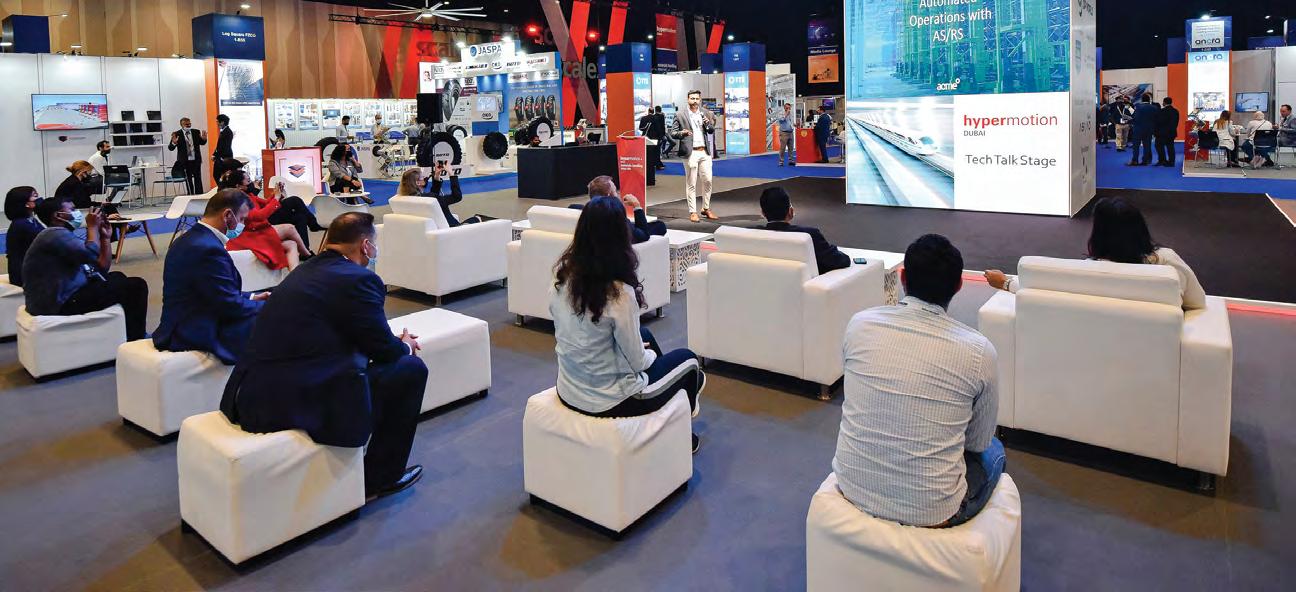
set sharing would be far-reaching. “The potential is huge but there are challenges in the MENA region with a lack of infrastructure and standardisation. Asset sharing will also impact the insurance sector with liabilities shifting and the entire system of asset ownership changing.”
Product showcases
The event was an ideal platform for companies to demonstrate their most recent developments. Centre Point Logistics (CPL), a Dubai-based logistic supply chain company, introduced its latest warehouse management system, Logiswift with the aim to improve the already impressive customer service.
The new system provides a complete live track and trace option for all its customers, ensuring that they are aware of where their cargo is in the supply chain.
Paul Morgan, CEO of CPL, said: “We’re committed to providing our customers with a one-stop, affordable logistics solution from manufacturer to consumer to enable businesses to sell everywhere effortlessly.”
IQ Fulfillment, the first robotic fulfilment solution in the MENA region, launched IQ Hybrid. IQ Hybrid a licensing model for the IQ Fulfillment solution that utilises IQ’s technology and modular processes and can be implemented instantly.
Fadi Amoudi, CEO of IQ Fulfillment, said: “Hypermotion Dubai’s first event, taking place at Expo 2020, represents an exceptional platform to launch IQ Hybrid as it brings together industry
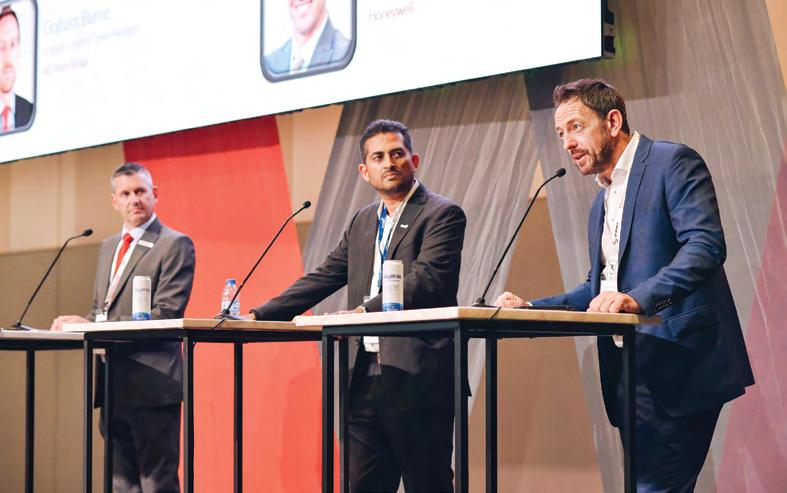
“HYPERMOTION DUBAI’S FIRST EVENT, TAKING PLACE AT EXPO 2020, REPRESENTS AN EXCEPTIONAL PLATFORM TO LAUNCH IQ HYBRID AS IT BRINGS TOGETHER INDUSTRY PIONEERS AND SMES, WHO ARE HARNESSING DISRUPTIVE DIGITAL TECHNOLOGIES FOR THE FUTURE OF LOGISTICS.”
pioneers and SMEs, who are harnessing disruptive digital technologies for the future of logistics. With IQ Hybrid, businesses can unlock global growth through its partner ecosystem and core markets in as little as 24 hours; generate revenue from day one; and benefit from seamless and centralized innovation, technology and R&D.”
Savoye, a logistics solution engineering company, too showcased its solutions at the event. It introduced its automated products for intralogistics and other

software which include Goods-To-Person system (GTP) and Autonomous Mobile Robots (AMR).
Alain Kaddoum, Managing Director of Savoye Middle East said: “Savoye has been providing autonomous hardware and software solutions to the intralogistics and supply chain groups for years. Since we recently expanded into the Middle East, it is a wonderful opportunity for us to participate in the Materials Handling Middle East show and showcase our unique solutions to industry experts and prospects.”
Swisslog Middle East presented AutoStore with a big live demo. It is a highly efficient robotised storage and order processing solution that integrates easily into existing buildings. This also provides the flexibility and scalability to meet changing demand while continuing to compress order cycle and delivery times.
Visitors also learned about other solutions by Swisslog such as CycloneCarrier which is aa reliable, efficient and best-inclass automated shuttle system designed for industries where high throughput and excellent availability are essential. It is particularly well-suited for the requirements of the eCommerce, pharmaceutical and fresh food industry.

IRF World Meeting showcased relevant knowledge to a wide cross-section of road mobility stakeholders and focused on delivering solutions to the world’s pressing mobility questions
The 18th edition of the International Roads Federation’s World Meeting & Exhibition held in Dubai from 7-10 November highlighted a renewed call for consensus-building and knowledge partnerships in our industry to address key sustainability and mobility challenges.
More than 250 papers and presentations were delivered by authors from 58 countries, representing an immense body of knowledge for policy makers and transportation stakeholders to utilise in the months and years ahead.
The IRF World Meeting & Exhibition was also characterised by an enhanced focus on new mobility services whose
emergence will continue impacting, challenging, and inspiring the industry.
In the closing ceremony, Senior Vice Chairman Dr. Bill Sowell noted that the event, which brought together 2,500 delegates from around the world, achieved several objectives, from gathering professionals for in person face-to-face meetings; to specifically addressing current challenges in the sector; to charting a forwardlooking strategy for the next decade.
About 80 international companies and start-ups participated in the accompanying exhibition to showcase the latest technology trends, services and solutions related to roads.
On the final day, Dubai’s Roads and Transport Authority (RTA) arranged technical tours for the participating delegations to some of Dubai’s iconic projects namely the Intelligent Traffic Systems Centre, Dubai Water Canal, Improvement of the Dubai-Al Ain Project, and a footbridge at the Marina.
The technical programme was assembled by a team of renowned specialists from 36 partner universities, and it comprised numerous sessions that addressed the next generation of road mobility, resilient transportation services, ‘Vision Zero’ road traffic injury strategies, and policy instruments to decarbonise the road sector.
“As demand recovers from the pandemic, it is our role to continue identifying models that reduce the footprint of the sector and fully prepare it for future mobility”, said C. Patrick Sankey, IRF President & CEO.
“This means greening our road networks, making them forgiving and self-explaining, more resilient to climate change, and readying our city streets for connected and electric vehicles.”
IRF Chairman H.E Eng. Abdullah Al-Mogbel stated: “These questions, and others, require a level of cross-industry consensus, which IRF is perfectly situated to address by building on the solid foundations of the 18th IRF World Meeting & Exhibition.”
The event also recognised professionals for their outstanding contribution to the industry. Eng. Khalid Al-Hogail, the President of the International Association Public Transport (UITP) and CEO of the Saudi Public Transport Company (SAPTCO), received the International Road Federation’s highest individual recognition.
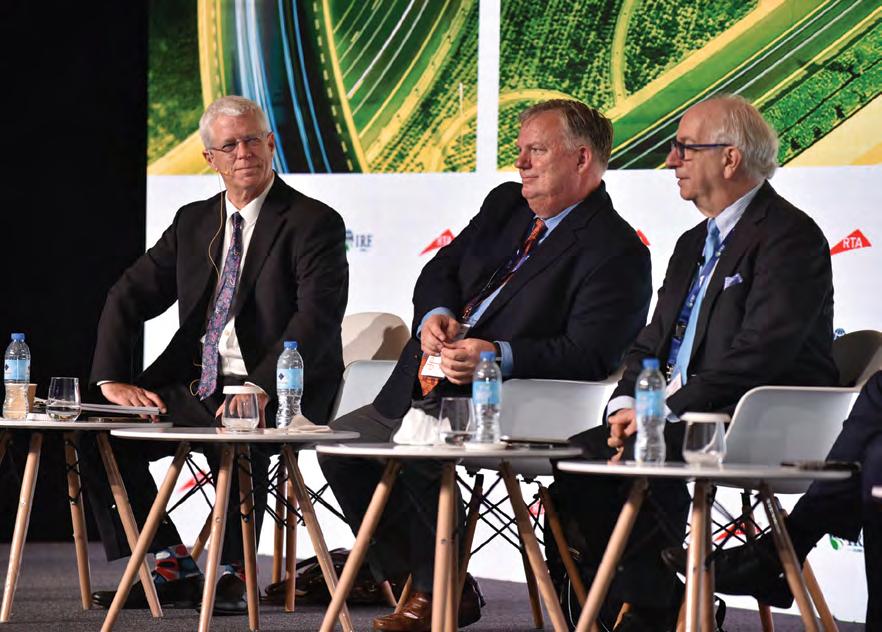
Established in 1951, IRF’s Man of the Year award recognises eminent public, private and education sector professionals with an outstanding track record of leadership and commitment to the road transport industry. Over the years, the award has distinguished some of the world’s most influential transport leaders for their work in the field of advocacy, policy, research, and educational programmes in support of better, safer, and more sustainable road networks globally.

“AS DEMAND RECOVERS FROM THE PANDEMIC, IT IS OUR ROLE TO CONTINUE IDENTIFYING MODELS THAT REDUCE THE FOOTPRINT OF THE SECTOR AND FULLY PREPARE IT FOR FUTURE MOBILITY.”
Additionally, IRF announced the winners of 2021 Global Road Achievement Awards. The winning projects this year ranged from the world’s longest mid-span suspension bridge recently completed in Turkey, to an original urban cooling pavement programme launched by the city of Los Angeles, to a 6D road scanning technology reliant on LIDAR.
Oleg V Pekerman, CEO & CIO, Fortis Consulting Services Corp. who accepted the award in the “Asset Preservation & Maintenance Management” category, stated: “If you want to know which companies are going to change the world soon, I strongly recommend reviewing the list of IRF members and GRAA winners.”

FedEx Express, a subsidiary of FedEx Corp. and the world’s largest express transportation company, revealed the findings of its ‘Future is Now’ study* that offers insights into the UAE’s readiness to embrace the future.
The UAE is at the cusp of change, with the pandemic accelerating the country’s digital transformation. From healthcare to education, banking to manufacturing, technology is transforming every sector, giving rise to a future full of possibilities. According to the study, which surveyed more than 750 respondents across the UAE, 96% stated that they believe the country is prioritising technology like Artificial Intelligence (AI), the Internet of Things (IoT), and Blockchain to deliver a future-ready world. Approximately 96% also believed technology they¬’d seen in science fiction movies is either already a part of their daily lives, or likely to be in the next few years.
With the trend of technology-led change likely to continue, future-forward industries were identified as major drivers in shaping the cities of the future. Roughly 96% respondents believe that the eCommerce sector will need to be more technologically driven to meet their needs better in the future, and 93% consider tech-enabled logistics important in a futuristic world.
Jack Muhs, Regional President of FedEx Express Middle East, Indian Subcontinent and Africa, said, “At FedEx, our past, present, and future is driven by innovation. We constantly look for new ways and ideas to meet our customers’ expectations and needs at the right time through the right channel, no matter where they are in the world.
“With digital transformation accelerating rapidly, technologies and innovative services with a focus on sustainability are expected to drive the future of business. Technologies like Blockchain, IoT, Robotics, and Automation are emerging as crucial elements in helping to future-proof prominent economic sectors and helping ensure business success.”
The ‘Future is Now’ study focused on three main views: being dynamic, how the UAE is open to experimentation and innovation, and to what degree the country is sustainability conscious. The findings indicated that future success will likely rely on businesses structuring their approach around these three outlooks.
Regardless of the industry, companies must monitor the pulse of their consumers, anticipate their needs, and stay one step ahead of their rapidly evolving expectations. The pandemic accelerated change in almost every aspect of life, from
how we live and work, to how businesses interact with their customers, and how customers purchase products and services.
The FedEx study shows that businesses are already working to keep pace with this change. Approximately 90% of respondents stated that over the past year, companies demonstrated their ability to understand ‘What’s next?’ and present possible solutions.
The UAE ranked first in the Gulf region and 33rd globally in the Global Innovation Index2and is considered as one of the top innovative economies. In an increasingly dynamic environment, success for businesses hinges upon pushing the envelope and fostering a culture of experiment-led innovation. A majority of 95% of those polled in the FedEx survey believe that organisations, communities, or even individuals who experiment and adopt change are better equipped to navigate through future challenges.
Consumers today are growing more conscious of the impact their choices have on the world around them - whether it pertains to the environment or their communities. Even their purchasing decisions are increasingly influenced by their perception of an organization being sustainable and responsible.
According to the FedEx study, over 88% of respondents agreed that individuals, communities, etc. that have a ‘futuristic’ outlook are more environmentally conscious. In fact, 93% claimed that, as decision-makers in a futuristic business, sustainability would be crucial and their top priority.
The response from the study participants is clear: organisations must continue to reevaluate and revamp their sustainability strategies to ensure relevance to their customers and resilience for the long term.
As the world keeps evolving, technology and trends will likely drive changes in lifestyle, behaviors, and attitude. For both businesses and individuals, embracing a future that offers endless possibilities and having a mindset that is dynamic, experimental, and sustainable will be imperative to staying one step ahead of the curve.

The CEO of Pakistan’s fastest growing logistics start up talks about what makes Swyft a success and of the country’s budding eCommerce potential
Tell us about your business model and what Swyft Logistics aims to achieve?
Swyft is the first, technology and data-driven last-mile delivery service in Pakistan. We aspire to reinvent logistics in Pakistan by staying a step ahead of our competition. By employing a system different from the contemporaries in the industry, Swyft provides a better, quick, and efficient flow of goods.
We make sure that both vendors and consumers have access to real time tracking and traceability, hence, ensuring a smooth last mile experience and remarkable customer service. The reason why our clientele is expanding and uber satisfied is predominantly due to our low return rates, flexible payment schedules, zero fake cancellations and more. We make sure that each vendor that joins hands with us grows and prospers, be it a market veteran or a brand-new venture.
How is the logistics sector changing in Pakistan?
With the emergence of eCommerce and rising digital literacy among consumers, our logistics industry has been changing significantly in the recent years. Factors such as rising disposable incomes, dual-income households, and constant urbanisation have encouraged customers across diverse economies to follow upcoming logistics trends.
This has further resulted in the rapid development of retail channels requiring efficient inventory management and warehousing solutions for helping the customers to make informed purchase decisions. The growing complexity and dynamic nature of supply chains require progressively advanced information technology solutions.

“WITH THE EMERGENCE OF ECOMMERCE AND RISING DIGITAL LITERACY AMONG CONSUMERS, OUR LOGISTICS INDUSTRY HAS BEEN CHANGING SIGNIFICANTLY IN THE RECENT YEARS. FACTORS SUCH AS RISING DISPOSABLE INCOMES, DUAL-INCOME HOUSEHOLDS, AND CONSTANT URBANISATION HAVE ENCOURAGED CUSTOMERS ACROSS DIVERSE ECONOMIES TO FOLLOW UPCOMING LOGISTICS TRENDS.”


Hence, the latest developments in the logistics’ industry involve technologybased management to reduce expenses and increase efficiency. As a result of this, many organisations will have to reshape their entire business to become more active with an efficient infrastructure at the heart of a successful customer-centric business.
What are the biggest challenges you face?
Being a start-up established in 2019, a major issue that we initially encountered while entering the logistics market in Pakistan, was that it had been already monopolised by old conventional lastmile companies.
One of our major concerns was establishing trust between our newly formed company and the clientele. The fact that made this task more difficult, was that we were expected to offer our premium services at highly competitive rates. Since we don’t outsource our services, we are not Pan Pakistan, like most of our competitors who have already established vast networks throughout the country.
However, we have come a long way! We have expanded to more than 55 cities and towns and our clientele base is growing day by day. We’re hopeful that these challenges won’t be as big of an obstacle in our journey anymore like they were when we first started.
How has the pandemic impacted the sector?
The pandemic proved to be a nightmare for most sectors of the economy, due to the decrease in trade, mobility and falling demand for goods and services. However, fortunately for Swyft and most of the logistics industry, this was a blessing in disguise and huge an opportunity for growth and prosperity.
Restrictions in mobility and frequent lockdowns led to the eCommerce industry booming. Sales of online businesses doubled, followed by a spike in the demand for our logistic services. Since, trade activities were restricted, this created a very favorable environment for local startups to flourish. Our coverage and outreach of not only major cities but also smaller towns and cities, gave us a huge advantage over other courier services which only delivered products to major cities.
Where do you see the logistics sector in Pakistan in the next five years?
The Pakistani logistics industry is still young and has a lot of potential for growth. With the eCommerce industry in Pakistan at boom, it is inevitable that the courier logistics sector will expand. The pandemic has made the Pakistani population resort to the eCommerce industry to fulfill their shopping needs, and this has increased consumer expectations from the courier companies.
A host of start-ups have entered the industry and companies are realising the
“RESTRICTIONS IN MOBILITY AND FREQUENT LOCKDOWNS LED TO THE ECOMMERCE INDUSTRY BOOMING.”
dire need of supply chain and logistics factors. Third party logistics companies have only recently started to derive and use data to achieve greater efficiencies. The increased interest of private companies in the logistics industry promises an elevated momentum in the growth of logistics and transportation industry.
What’s in the pipeline for Swyft Logistics?
There are numerous milestones that we look forward to achieving. Having a nationwide presence is on the table for Swyft. We are currently looking forward to expanding across Pakistan. Taking pride in being the most tech-oriented logistics provider in the industry, we are also looking forward to harnessing the reins of the automated warehousing and fulfillment sector.
This will enable us to provide value added services to our vendors and would help us set a benchmark in the industry, alongside, tapping into the retail sector and explore further opportunities. Leadership and teamwork go hand-inhand. Therefore, at Swyft, we create a comfortable and positive work environment that inspires us to learn, grow and excel every day.

Our SynQ
SynQ
swisslog.com
swisslog.com
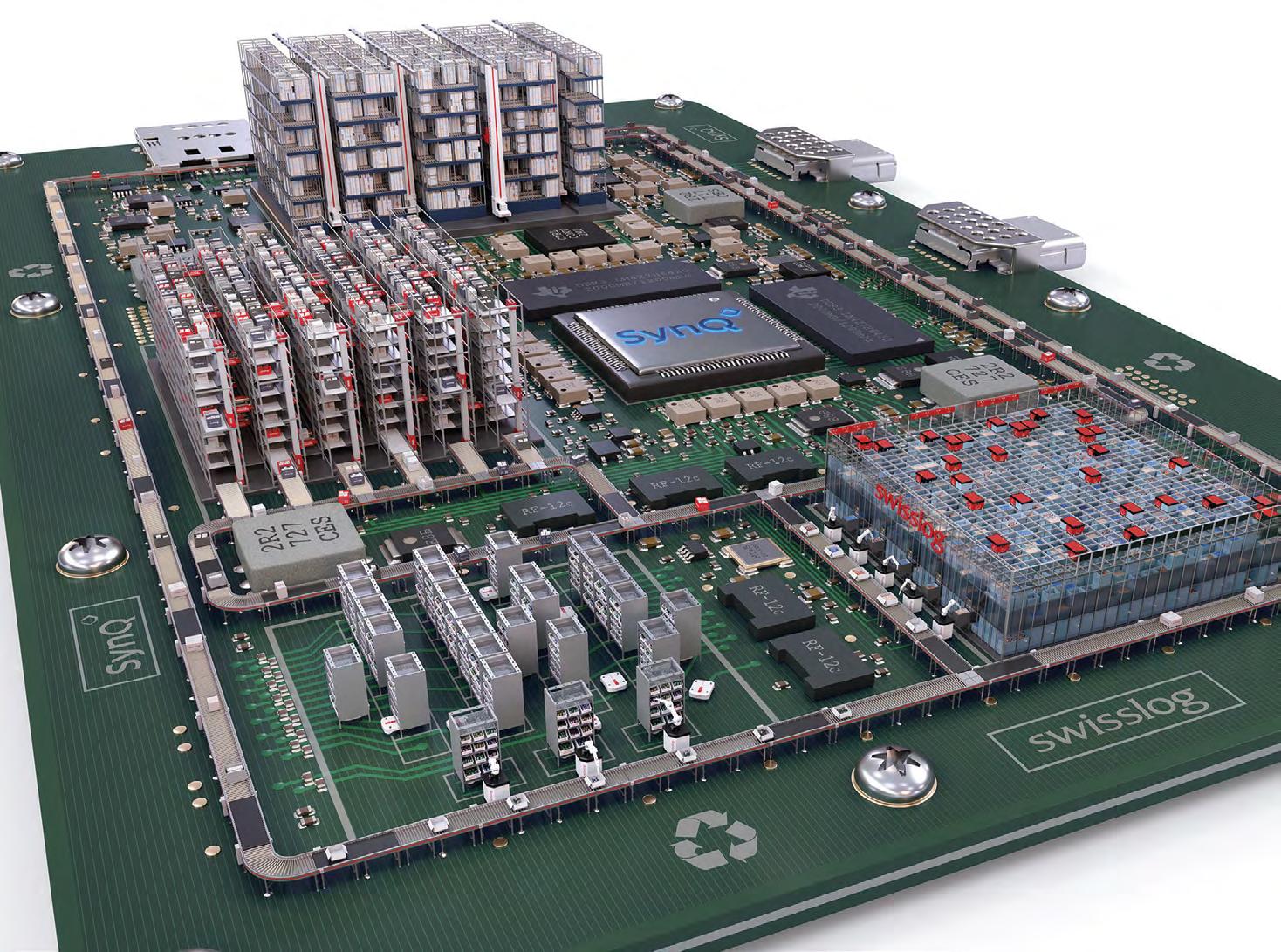
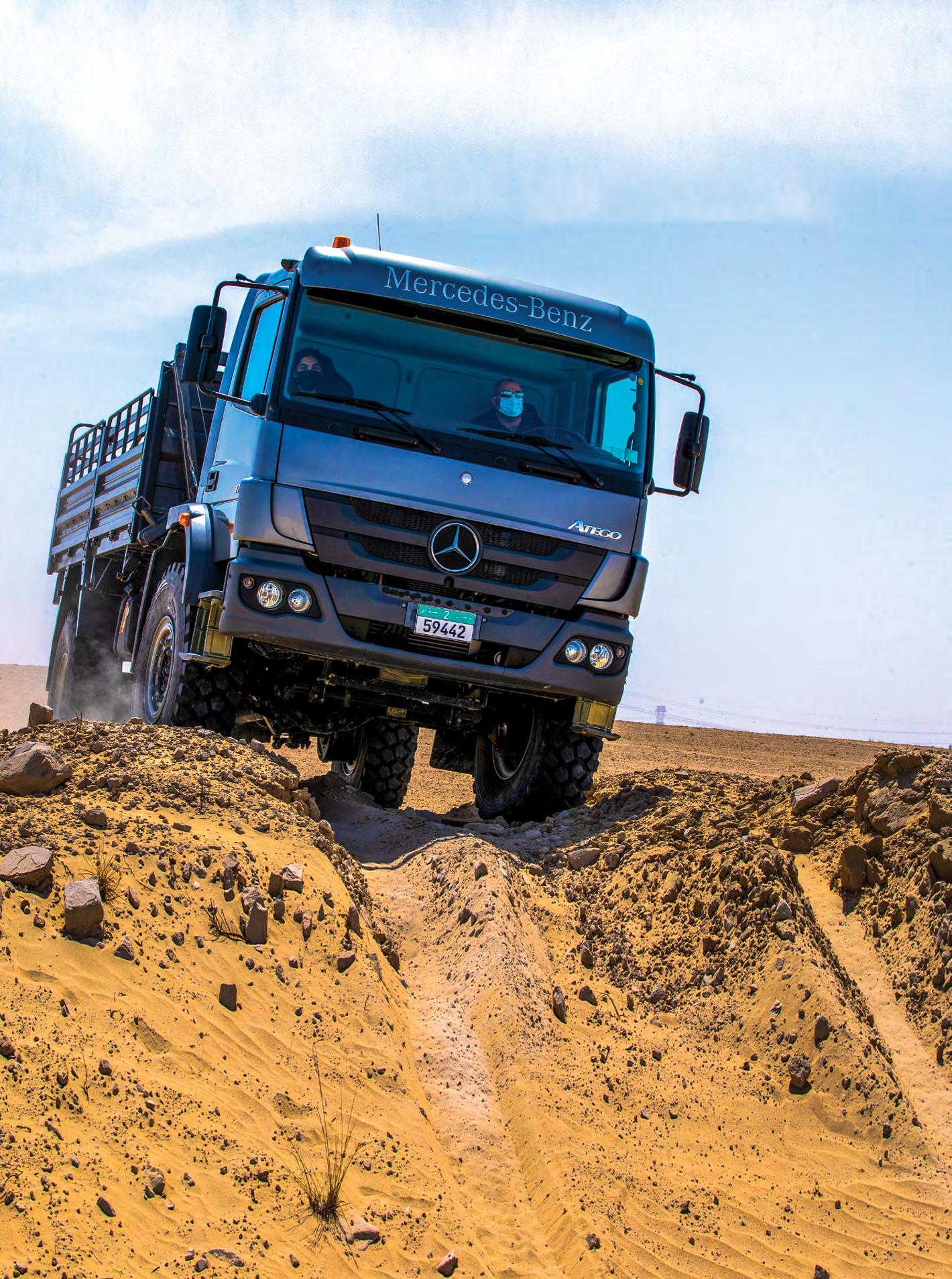
EFFICIENCY AND RELIABILITY ARE WHAT THE MERCEDES-BENZ ATEGO
CHAMPION AS IT OFFERS THE USERS A SMOOTH DRIVING EXPERIENCE
COUPLED WITH REDUCED COSTS AND INCREASED SAFETY
Unlike cars, trucks are not status symbols or luxury purchases. They are meant to deliver goods at the lowest cost possible and in the most efficient manner, and that is precisely what the light-duty distribution truck Atego offers.
Mecedes-Benz Trucks teamed up with Allison Transmission, a designer and manufacturer of conventional and electrified vehicle propulsion solutions and the largest global manufacturer of mediumand heavy-duty fully automatic transmissions for commercial and defense vehicles.
Powered by the Allison 3000 Series transmission, the Atego comes in range of configurations to suit every sector’s requirement.
SPECIFICATIONS AND FEATURES
Technological enhancements, driver comforts and safety elements are aspects truck manufacturers are now focusing on. Allison Transmission’s 3000 Series transmission is designed for medium-duty commercial vehicles. Engineered to adapt and operate efficiently in a variety of applications, this series is available with close- or wide-ratio gearing and up to seven speeds.
An engine-driven Power Take-Off (PTO) is an option, as well as an integral output retarder that provides enhanced vehicle braking and reduces brake wear. Operation is further enhanced by Allison’s
advanced electronic controls, which also have prognostics capabilities.
“It is great to finally see the new development of the Allison 3000 Series built into our Atego 4x4 on the road, as this project was specifically developed for the needs of our customers in the MENA region,” said Olaf Petersen, General Manager Mercedes-Benz, and Fuso Trucks Sales.
“We see several special applications benefiting from this combination, from fire-fighting to off-road operations in our trucks. The fully automatic transmission with torque converter allows vehicle owners and drivers to work with high confidence. It relieves the driver from shifting activities, allowing them to fully concentrate on their driving. The risk for wrong shifting is out of question and uptime is increased offering a high benefit to the truck owner,” said Olaf.
With the Allisson Transmission, manoeuvring the vehicle becomes even more easier, especially in stop-and-go traffic situations. The ease of control further gives the driver peace of mind.
“Our longstanding global collaboration with Mercedes-Benz Trucks continues. Through this partnership, we look forward to jointly providing a reliable and powerful solution to customers in the market.


“IT IS GREAT TO FINALLY SEE THE NEW DEVELOPMENT OF THE ALLISON 3000 SERIES BUILT INTO OUR ATEGO 4X4 ON THE ROAD, AS THIS PROJECT WAS SPECIFICALLY DEVELOPED FOR THE NEEDS OF OUR CUSTOMERS IN THE MENA REGION.”
“When you consider harsh and demanding environments like off-road terrain or heavy start-stop operations, you want maximum power and vehicle control.
Fully automatic transmissions will increase driver comfort, provide ease of operation and optimal manoeuvrability,” said Muhammad Ibrahim Khan, Allison Transmission Middle East Area Sales and OEMs Account Manager.
“Driving a 4x4 Mercedes-Benz Atego 4x4 equipped with an Allison 3000 Series transmission provides uninterrupted power to the wheels and makes it easy for a driver to focus on their job, keeping both hands on the wheel and eyes on the road,” said Olaf.
Allison Transmission and MercedesBenz Trucks have maintained a strong partnership in the region. The companies plan to further serve the region with the same dedication and relentless efforts.

New Euro 5 range offers enhanced durability and boosts profitability and includes the Euro 5 Quester and Croner
UD Trucks launched the Euro 5 versions of its popular Quester and Croner trucks in the region for the first time. The new trucks feature significant upgrades to minimise their environmental impact, improve efficiency and uptime, increase profitability, and optimise the Total Cost of Ownership (TCO), all without compromising the benefits offered by the previous models.
The launch of the new Euro 5 trucks comes ahead of the introduction of new regulations in fast-growing regional countries such as the UAE, which currently has a Euro 4 emission standard, and Qatar, which will be adopting Euro 5 emission
standards by mid-2022.
This move by UD Trucks allows businesses to better prepare for the switch to more environmentally friendly fleets, as the Euro 5 range reduces NOx emissions by about 43% compared to Euro 4 and significantly reduces the carbon footprint of the vehicles through cleaner emissions.
The official launch event was UD Trucks’ first since the onset of the COVID-19 pandemic and took place at the Dubai Autodrome. The event, which adhered to all necessary health and safety guidelines, was attended by the Japanese Consul-General in the UAE, Noboru Sekiguchi, as well as some 160 customers from across the region, who were able to experience driving the new trucks first-
hand and were also given a chance to visit Expo 2020.
FEATURES AND ENHANCEMENTS
The Quester and Croner come in both automatic and manual transmissions with enhanced safety features. The Quester drives smooth giving the driver a pleasant experience especially on turns and uneven road conditions.
The number of advanced features offered on the Quester, one of UD Trucks’ most established, durable, and efficient trucks, has been added along with the latest Euro 5 upgrade. The Quester Euro 5 range, with 460 hp and 2250 Nm torque, also delivers improved fuel economy by about 10 percent, assisted by the ESCOT automated manual transmission feature, a lighter tare weight and optimised driveline.
Improvements made to the new Quester also extend to safety, where ESCOT takes away the drivers’ need to shift an average of 1,000-1,500 times a day by automati-

cally selecting the right gear at any given time. This leads to increased focus and safety for the driver.
The latest Euro 5 upgrades also add to the Croner’s impressive specification list. The Croner is available in three models - MKE, LKE and PKE - with wheelbase variants that offer up to 21 different configurations to suit the specific demands of various industries. The truck’s fuel efficiency has been improved, in part due to a more aerodynamic cab design that reduces drag by 5% compared to previous models.
The Croner is very much driver focused as its cabin is designed to put driver comfort first with numerous active and passive safety features to protect the driver, cargo, and surrounding traffic.
Considering that emissions from transportation alone have the potential to increase global emission levels by over 1.5%, these heavy-duty and medium duty trucks, which combine optimal fuel efficiency with enhanced durability, have evolved further to meet modern transport and environmental challenges.
Being the first truck manufacturer to introduce Selective Catalytic Reduction (SCR) technology in 2004, UD Trucks’ new range features SCR technology to significantly boost environmental protection and fuel economy. With such benefits, SCR technology is proven to be more reliable when compared to other emission control technologies for reducing emissions.
The new range focuses on three themes: improved efficiency and optimised TCO;
better uptime; and better for the environment. The truck manufacturer also delivers better uptime for both models via less maintenance time and an expanded AdBlue supply network, which is a safeto-use diesel exhaust fluid used in vehicles with SCR technology to reduce harmful gases from being released into the atmosphere.
Most importantly, a cleaner and more robust engine configuration with lower sensitivity to sulfur content in fuel leads to a longer engine life and contributes to a better environment. The truck is fitted with innovative UD Telematics - a hightech wireless communications system, which allows transportation companies to maximise efficiency with real-time vehicle tracking and geo-fencing.
The Quester provides the ultimate comfort and experience for the driver with a
new steering wheel and improved seat. The new range of Quester and Croner trucks, both Euro 5 and Euro 3, features a new instrument cluster with real-time fuel coaching. This enhancement provides the driver with immediate and specific feedback on driving techniques that are more fuel efficient.
Mourad Hedna, President of UD Trucks Middle East, East and North Africa, said: “In the rapidly-changing trucks industry, launching the Euro 5 trucks is a core focus for UD Trucks. The Quester and Croner Euro 5 models reflect UD Trucks’ ‘Better Life’ commitment. The launch is another example of offering optimum support for our customers as we make sure they are ready for any new regulations in such a fast-growing region.”
The new Euro 5 models are available in the UAE and Qatar. At the same time, regional markets such as Saudi Arabia, Bahrain, Kuwait, Pakistan, Iraq, and others will benefit from new, improved versions of the Euro 3 Quester and Croner models.
These new Euro 3 models will also enjoy several upgrades and improvements to offer a more driver-focused and environmentally friendly alternative, while ensuring optimum profitability for customers around the region.
Other than the engines, the Euro 3 trucks receive the same upgrades as the Euro 5 models, such as the new instrument cluster, ESCOT automated manual transmission feature, fuel coaching system, body builder module, and the UD Trucks Telematics Services.

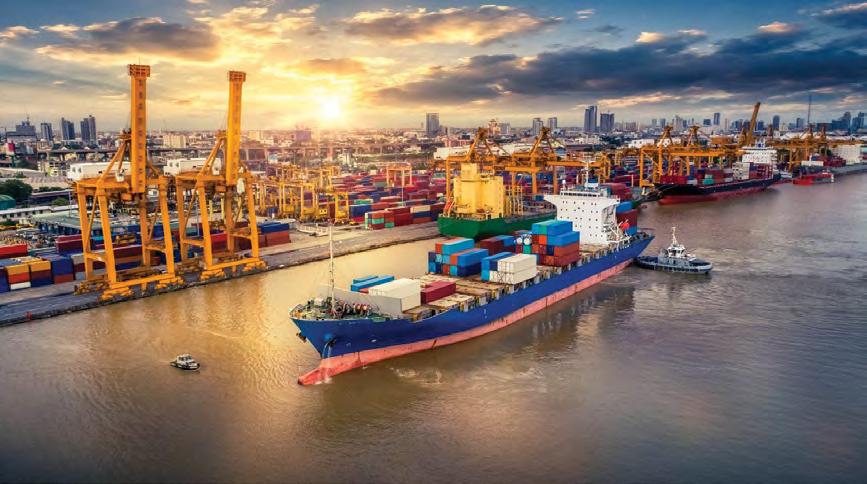
TO CUT GLOBAL SHIPPING EMISSION BY UP TO 80%
GREEN HYDROGEN-BASED FUELS SET TO BE THE BACKBONE FOR THE SECTOR’S DECARBONISATION, IRENA SAYS
Arapid replacement of fossil fuels with renewable fuels based on green hydrogen and advanced biofuels could enable to cut up to 80% of CO2 emissions attributed to international maritime shipping by mid-century, a new report by the International Renewable Energy Agency (IRENA) finds.
Renewable fuels should contribute at least 70% of the sector’s energy mix in 2050, IRENA’s “A pathway to decarbonise the shipping sector by 2050” shows, outlining a roadmap for the global shipping sector in line with the global 1.5°C climate goal.
IRENA’s Director-General Francesco La Camera said: “Between 80% and 90% of international trade is enabled through maritime means. Decarbonising global shipping is one of the most challenging sectors to address - and despite raised ambitions - current plans fall short of what is needed. This IRENA outlook clearly shows that cutting CO2 emissions in such a strategic, hard to abate sector is technically feasible through green hydrogen fuels.”
‘‘Taking early action is critical’, La Camera added. “May this report encourage policy makers, ship owners and operators, port authorities, renewable energy developers and utilities to work together towards common climate goals and show their ambition to world leaders at the UN climate conference COP26 in Glasgow.”
If the international shipping sector were a country, it would be the sixth- or seventh-largest CO2 emitter. IRENA’s decarbonisation 1.5°C pathway is based on four key measures such indirect electrification by employing green hydrogen-based fuels, the inclusion of advanced biofuels, the improvement of vessels’ energy efficiency and the reduction of sectoral activity due systemic changes in global trade dynamics.
In the short term, advanced biofuels will play a key role in cutting emissions, providing up to 10% of the sector’s total energy mix in 2050. In the medium and long-term green hydrogen-based fuels will be pivotal, making up 60% of the energy mix in 2050.
“CLIMATE GOALS AND DECARBONISATION AMBITION CAN BE RAISED BY ADOPTING RELEVANT AND TIMELY COORDINATED INTERNATIONAL POLICY MEASURES.”
eMethanol and eAmmonia are the most promising green hydrogen-based fuels, with particularly eAmmonia set to be the backbone for the sector’s decarbonising by 2050. IRENA report flags that eAmmonia could represent as much as 43% of the sector’s energy needs in 2050, which would imply the use of about 183 million tonnes of renewable ammonia for international shipping alone, a comparable amount to today’s ammonia global production.
IRENA’s report also finds that the production costs of alternative fuels and their availability will ultimately dictate the actual employment of renewable fuels. Moving from nearly zero CO2 emissions to net zero requires a 100% renewable energy mix by 2050.
While renewable energy costs have been falling at an accelerated rate, further cost declines are needed for renewable energy-derived fuels to become the prime choice of propulsion. Climate goals and decarbonisation ambition can be raised by adopting relevant and timely co-ordinated international policy measures. A realistic carbon levy will be critical, putting an adjustable carbon price on each fuel to prevent new fossil fuel investments and stranded assets.
Finally, the report calls on all stakeholders to develop broader business models and establish strategic partnerships involving energy-intensive industries, as well as power suppliers and the petrochemical sector.
Stakeholders need to be fully mapped out and engaged, the various players need to work towards a common goal. Accordingly, governing bodies regulating the international shipping sector need to develop integral and participative planning exercises, establishing step-by-step actions for reaching zero emissions by 2050.
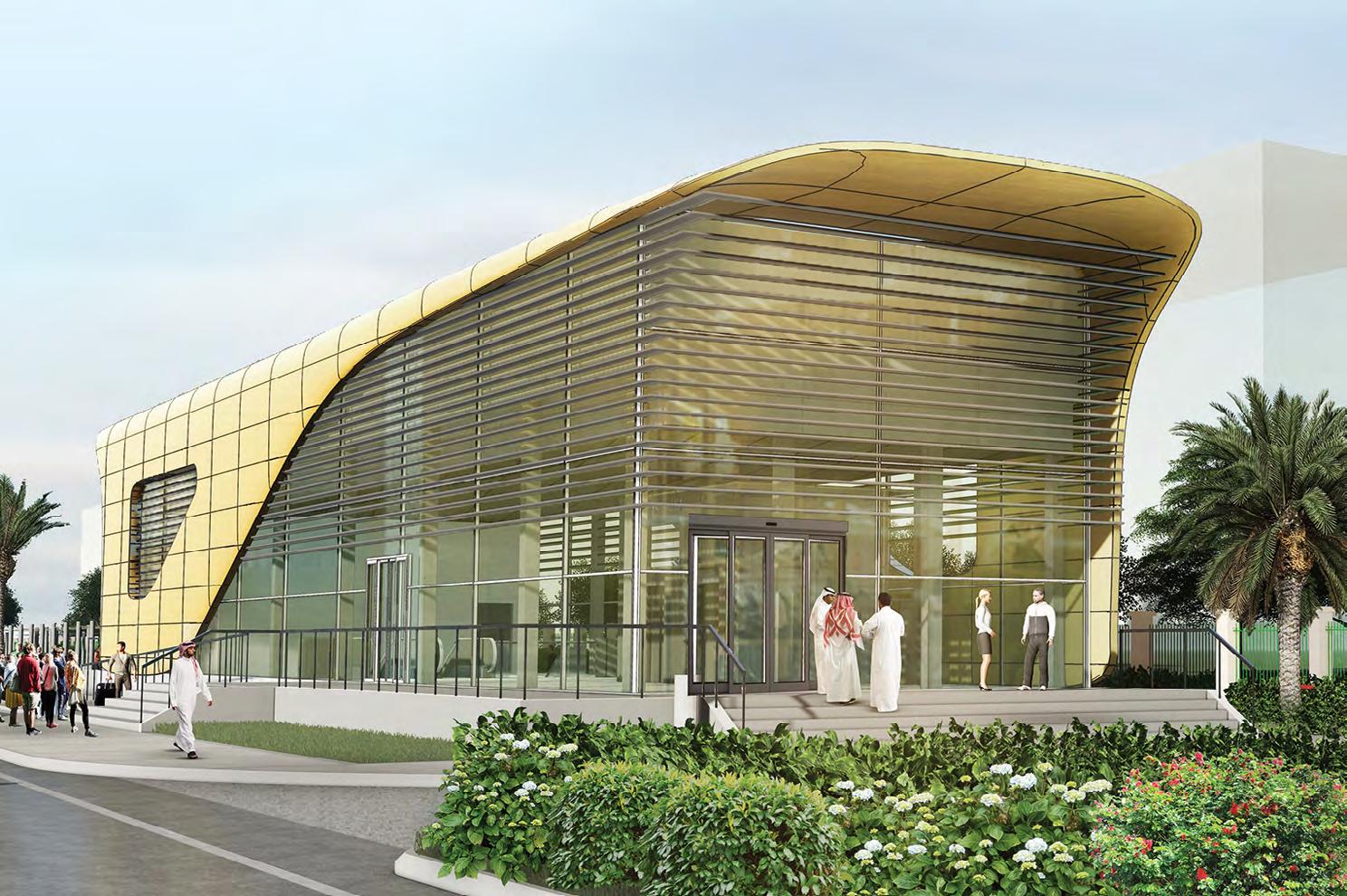
efficient, reliable & modern fleet
This is a first-of-its-kind Cargo SUV model which is now available across Al Masaood Automobile , Renault showrooms in Abu Dhabi & Al Ain.
